Today, mental illness pits our aging gumshoe, Egg Pascha, against his most formidable foe - himself.
 Still, his friend, Alven
Still, his friend, Alven
 Alven, deuteroganist[description:= β Black male, early-70s years /// character:= retired police sergeant having a decades-long friendship with Egg Pascha, a jolly-go-lucky retiree who is always there when you need him🙂, his only real concern these days is for his brother-in-law, Dominique, who is on the precipice of being released from prison after decades, enjoys his hobbies and spending his well-earned money on himself, resides in Babson Park, FL but is on an extended stay in Brandywine to act as a legal representative on behalf of Pascha, bothered by a nagging spider🕷️ bite that is restricting his ambulation, probably the sole person with insight into lnq's playbook]///
, is there to help,
Alven, deuteroganist[description:= β Black male, early-70s years /// character:= retired police sergeant having a decades-long friendship with Egg Pascha, a jolly-go-lucky retiree who is always there when you need him🙂, his only real concern these days is for his brother-in-law, Dominique, who is on the precipice of being released from prison after decades, enjoys his hobbies and spending his well-earned money on himself, resides in Babson Park, FL but is on an extended stay in Brandywine to act as a legal representative on behalf of Pascha, bothered by a nagging spider🕷️ bite that is restricting his ambulation, probably the sole person with insight into lnq's playbook]///
, is there to help,
 while his work partner - Bunny
while his work partner - Bunny
 Micha "🐇Bunny" Petrakis, understudy of Egg Pascha[description:= White female, early-30s years, thicc build (5'6'', 150lbs.-- really able to "squeeze in them jeans"), strong features of her Greek/Mediterranean heritage (dark hair/eyes) /// character := on loan to the CGIS-Brandywine from NCIS-Quantico, she looks nice but she's not nice, comfortable with Negroes and their culture yet bigoted at her core, imposing and intimidating, sapiosexual, sly, bold, opportunistic, a cold and conniving dyke with a weird masculine-to-feminine quotient (60/40)]///
, only makes things worse.
Micha "🐇Bunny" Petrakis, understudy of Egg Pascha[description:= White female, early-30s years, thicc build (5'6'', 150lbs.-- really able to "squeeze in them jeans"), strong features of her Greek/Mediterranean heritage (dark hair/eyes) /// character := on loan to the CGIS-Brandywine from NCIS-Quantico, she looks nice but she's not nice, comfortable with Negroes and their culture yet bigoted at her core, imposing and intimidating, sapiosexual, sly, bold, opportunistic, a cold and conniving dyke with a weird masculine-to-feminine quotient (60/40)]///
, only makes things worse.

--------
Sponsored by Mr. Alphabet
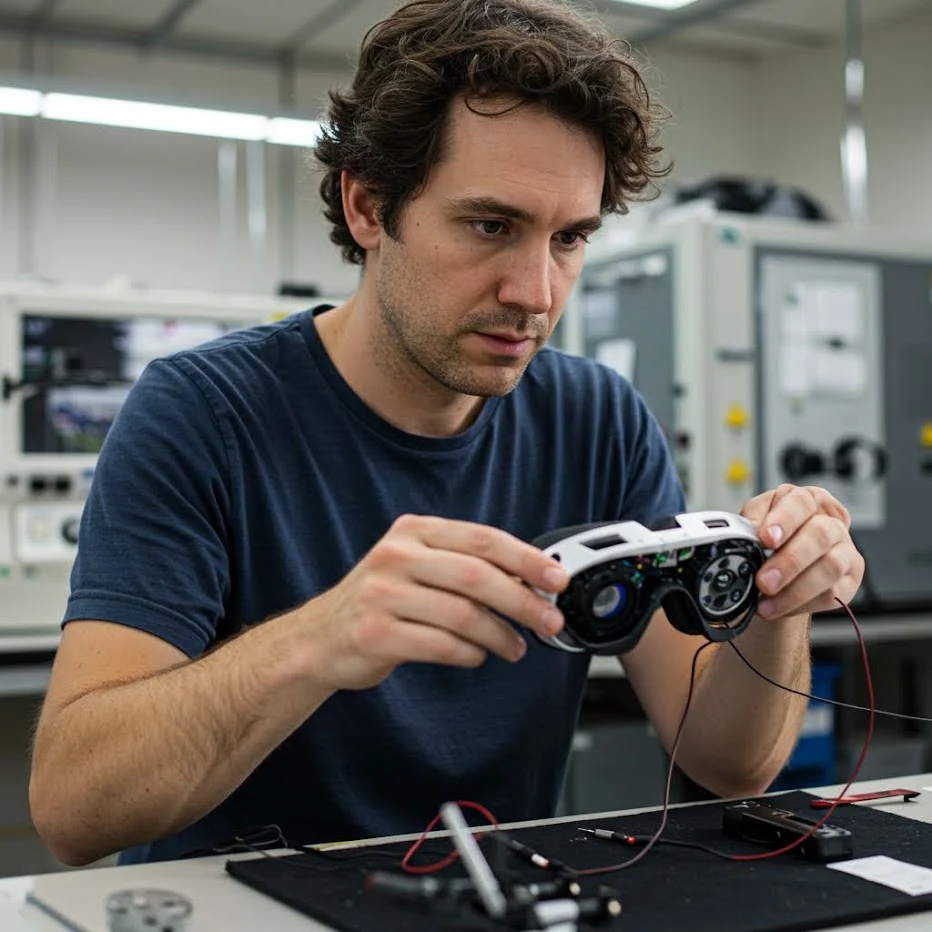 Dwight Mann, mysterious leader of the conglomerate, Nile LLC[description:= White male, late 30s years, dark features /// character:= incredibly smart technologist who heads the world's most valuable company, of Ivy League (Princeton+Wharton) pedigree, always on the hunt for a good deal, his money makes him that much better-looking and he acts the part, has a mild fascination with East Asian cultures, vested interest in space colonization🚀, modeled after Jeff Bezos[i], Elon Musk[ii], and Robert Pera]///
, a high-stakes tournament for
Dwight Mann, mysterious leader of the conglomerate, Nile LLC[description:= White male, late 30s years, dark features /// character:= incredibly smart technologist who heads the world's most valuable company, of Ivy League (Princeton+Wharton) pedigree, always on the hunt for a good deal, his money makes him that much better-looking and he acts the part, has a mild fascination with East Asian cultures, vested interest in space colonization🚀, modeled after Jeff Bezos[i], Elon Musk[ii], and Robert Pera]///
, a high-stakes tournament for artificial intelligence development - Philadelphia Artificial Lambda Model (PALM) - is underway in Brandywine.





--------
Pascha's daughter, Lily
 Lily, daughter of Egg Pascha[description:= λ White female, mid-40s years /// character:= single mother of (adopted) twin preschoolers, Antoney and Isabell Ndongo, on the cusp of 'finding' herself, an
Lily, daughter of Egg Pascha[description:= λ White female, mid-40s years /// character:= single mother of (adopted) twin preschoolers, Antoney and Isabell Ndongo, on the cusp of 'finding' herself, an intelligence operative (= technical admin. + government liason) employed as a close business associate of Maundy, cutthroat, licentious, very calculated, fast-paced MBA-type who - as team lead (pod = Lily, Gruber, Ellis) - is just as invested as her boss in making sure the company is in a secure position, super stressed, sides with her mother in despising her dad but would be unsure why if she did some self-introspection, clinically diagnosed with anxiety disorder and manic depression]///
, and her pod cohorts - Gunyo
 Gunyo "Little Gun" Gruber, a member of Lily's pod[description:= White male, late-30s years, tall at 6'3'' /// character:= cunning staff counsel, debonair, meticulous / by-the-book, diligent, dutiful, team player, and sacrificial in the sense that he's willing to go above and beyond, a hired Pinkerton possessing latent military skills, an amateur magician with a penchant for pranks as well as being a master of special effects, talks in a bizarre off-Australian twang]///
+ Ellis
Gunyo "Little Gun" Gruber, a member of Lily's pod[description:= White male, late-30s years, tall at 6'3'' /// character:= cunning staff counsel, debonair, meticulous / by-the-book, diligent, dutiful, team player, and sacrificial in the sense that he's willing to go above and beyond, a hired Pinkerton possessing latent military skills, an amateur magician with a penchant for pranks as well as being a master of special effects, talks in a bizarre off-Australian twang]///
+ Ellis
 Earl Ellis, a sleazy business executive and
Earl Ellis, a sleazy business executive and key member of Lily's pod[description:= White male, 40-ish years /// character:= team business analyst / econ whiz, nearly completely misreads how he comes across to others thus becoming unintentional comic relief, gateway drug user, a late-life bloomer who schmoozes his way into opportunities yet is undeniably good at what he does]///
- contract with a foreign agency, putting the nation's security at-risk after having sidestepped advisory from their boss.



"I like magic. Doesn't everybody enjoy a good trick? You can't fault me for knowing the truth: that greed works in reverse; no one is as rich as they want to be, only as poor as they claim to be." - Gunyo Gruber
/// We know that (according to the literature), despite his gruesome exterior, Gruber did what he did (perhaps not in the manner that he did it) because he was a freedom fighter for the underdog. Ironically, he attacked the Klaxon corporation because he thought - thanks to his independent leftist leanings - that the company wasn't doing enough to help the less fortunate in the South American country from which it was exploiting. In that sense, he (as the leader of a terrorist group) was a self-proclaimed Robin Hood. Here, not so much.
¶Our first encounter with Gruber comes early in ChordN, where he is an incredibly condescending Pinkerton contractor working alongside Lily in her pod (= Lily, Gruber, Ellis) on behalf of shipping magnate, Maundy Lindros, in Philadelphia, Pennsylvania.

¶Normally, Maundy wouldn't need the services of someone like a Gruber, who is a versatile mercenary employed by her business to head general counsel as she battles legal difficulties put forth by the incoming competitor, Dwight Mann and his company, Nile, LLC, because she's made do just fine these past forty+ years with smart management to her credit. But the days are no longer quotidian. This is the first time in her career that Maundy has had to operate from a position of apparent weakness - a challenge she does not relish by any means - as she engages with her longtime political rival, Ember Libitina, in the civic sphere.
¶During this unusually busy Eastertide, Gruber's pod is tasked with representing Delaware Valley's most notorious kingpin, Theo, who's currently caught up in a legal quagmire not of his own doing (hint). Gunyo, specifically, has the skillset (and some backdoor connections) to 'magically' bend the law in his client's favor, but for a 'small' price.

¶Some call him "Little Gun", even though he stands an imposing 6'3''. -->I made up the word 'gunyo' to mean 'little gun' in some faux Yiddish. I doubt someone would name their kid that, but it works well here (I'm very proud of it, too😁), taking into consideration that Gruber's first name in the book was actually Anton ("Little Tony the Red"), not Hans.<-- He's nice when he has to be, the jobs call for it. Just know that Gruber is a dangerous German-born double agent for the IDF. He was hired to do a job - and he'll do it well - but can he really outmaneuver Ms. Lindros at her own game? We have four (4) chords to do a character study and learn his fate, as Gruber starts out as a lightweight, but becomes a major player by ChordH.
--------
Maundy Lindros'
Maundy Lindros, coloratura[description:= ε White female, late-70s years (30s years in 1978 flashback), Swedish heritage /// character:= an eccentric and aloof genius who views few as intellectual peers, a classically trained physicist, accomplished (William & Mary PhD in Physics at age 16 -- research on extraterrestrial viscosity dynamics // thesis: "Quantum Leaps in the Material Science of Alloys" -- she remains the youngest person ever elected to the American Academy of Engineering[w]), ultra-conservative of high society pedigree (heiress to the Lindros FlyerCast & Irons, Ltd. company), ambitious entrepreneur with a knack for being in the right place at the right time, has carefully crafted her public persona in order to avoid suspicion, perceptive, callous, willing to do whatever it takes so that the rules are bent in her favor, a not-so-well-known phantom figure that works behind-the-scenes (doesn't get hands dirty/meticulously covers tracks), hates repeating herself, territorial, not to be taken lightly, competitive, proud, immediate, urbane with her head full of white hair, regal, minimalist, mute and blind (visually impaired, born with both blindness and alalia but with heightened senses otherwise, expresses herself using a keyboard⌨️) but with an eye on the big picture, prefers her money do the talking, she's committed to her business (moonlights as a shipping magnate) and lives by the pericope 'You deserve what you let happen to you.']///
bet on 'Meroë' has paid dividends, however, its maturity came with a clash of social residuals, including the reactions from the kingpin, Theo
![]()
 Darby "Theo" Park, kingpin[description:= θ Black male, 20-25 years /// character:= brash and sophisticated Robin Hood-esque megalomaniacal high-IQ biohacker largely reputed as "the brightest
Darby "Theo" Park, kingpin[description:= θ Black male, 20-25 years /// character:= brash and sophisticated Robin Hood-esque megalomaniacal high-IQ biohacker largely reputed as "the brightest neuropunk/biopunk on the streets", a libertarian ideologue who idolizes 🧑🏿lnq, rogue, ambitious, huge Philadelphia Eagles🦅 fan, swag whore, former computer security consultant who authored the 'fabl3' payload, now a wanted criminal (for unlawful pharmacauticals, and declaration of terrorist biowarfare/violation of the BWC) who is the subject of a joint CGSI+BIS hunt (and has been for three years), misunderstood, notorious and feared leader of an extremely dangerous criminal network arisen from East Philly, bitter from recent personal life experiences, tempered with Napoleon complex; sees the world as full of 'winners' or 'losers', seeks the truth and wants absolute control over the game]///
, on whom a dragnet has been placed.









"I've never killed anyone. But, killers respect killers, and you have my respect." - lnq👨🏿🦱
monody[description:= Δ Black male, mid-40s years, this guy's physical resemblance to Link Starbureiy is uncanny😉 /// character:= leader of the 'Four Horsemen' (the "🦍silverback" of his troop), a volunteer firefighter👨🏿🚒 who is dominant, anti-heroic, anti-hype, an idealogue, wise🦉, provocative, retaliatory, raw, 💊red pilled + seething, extreme, gone, schizophrenic/crazed, ruthless+lawless, a vicious misfit, karma personified, militant, genocidal and careless of internecine, wrathful, has a big Black dick🍆 and wields big dick energy, bellicose and on his bully wanting others to 'feel his pain', no joke, 'that motherfucker!', not easily fooled, merciless, bold and hardcore, fearless+🦁lionhearted, believes himself to be the 🐑sheep/goat/ram🐏 on a crusade for freedom]
--------
"Old Habits" (synopsis)

¶
(ritornello: Eastertide {40 select days between March 26 - December 31}, 1978 ["Die, Detective!"]) - Egg Pascha, a young southpaw steel worker from Bethlehem, Pennsylvania,



moved to Brandywine to enlist in the United States Coast Guard. A ranking seaman (E-3), his bravery as a search-and-rescue amphibious diver (frogman) is quickly acknowledged and rewarded in forming a lasting friendship with his superior, Alven (PO3).



 The two have ambitions of being entertainers as a side hustle with their four-person vaudeville troupe 'Bruno'.
The two have ambitions of being entertainers as a side hustle with their four-person vaudeville troupe 'Bruno'.

¶Auditions for the final talent show at the famed Temple Theater are taking place before its shuttering, which happens to coincide with both the intra-city riot instigated by the aftermath of aggression towards the GO outfit, as well as a spree of mysterious abductions of military personnel by some menace profiled as "Colin" that began earlier in the Summer.
¶--- NARRATIVE: After a six-year city-mandated hiatus, Brandywine's famed Temple Theater is having what it calls its 'Easter Week': a one-off weeklong revival showcase ("The Jukebox") before it finally closes its doors due to increasing blight in the north part of town; the neighborhood is no longer as safe and vibrant as it was just a decade prior.
 The African-American (B1/ADOS/FBA) community is still feeling the effects of the Civil Rights Movement, compounded with first Chief of Police and then-Mayor Luigi's antics and policies frozen in place during that decade. Turning inward, the Community becomes increasingly activist, self-destructive, and simultaneously self-expressive.
The African-American (B1/ADOS/FBA) community is still feeling the effects of the Civil Rights Movement, compounded with first Chief of Police and then-Mayor Luigi's antics and policies frozen in place during that decade. Turning inward, the Community becomes increasingly activist, self-destructive, and simultaneously self-expressive.

In the middle of all this we have some blue-eyed soul, a young Egg Pascha who is also struggling to find his place in the world as he chases his dreams, follows his heart, and succumbs to destiny. This part of the story (fictitiously what transpires in the aftermath of the Amateur Night held on Saturday August 5, 1978) is the most pivotal in telling because the events define who and what our eponym is (to become).

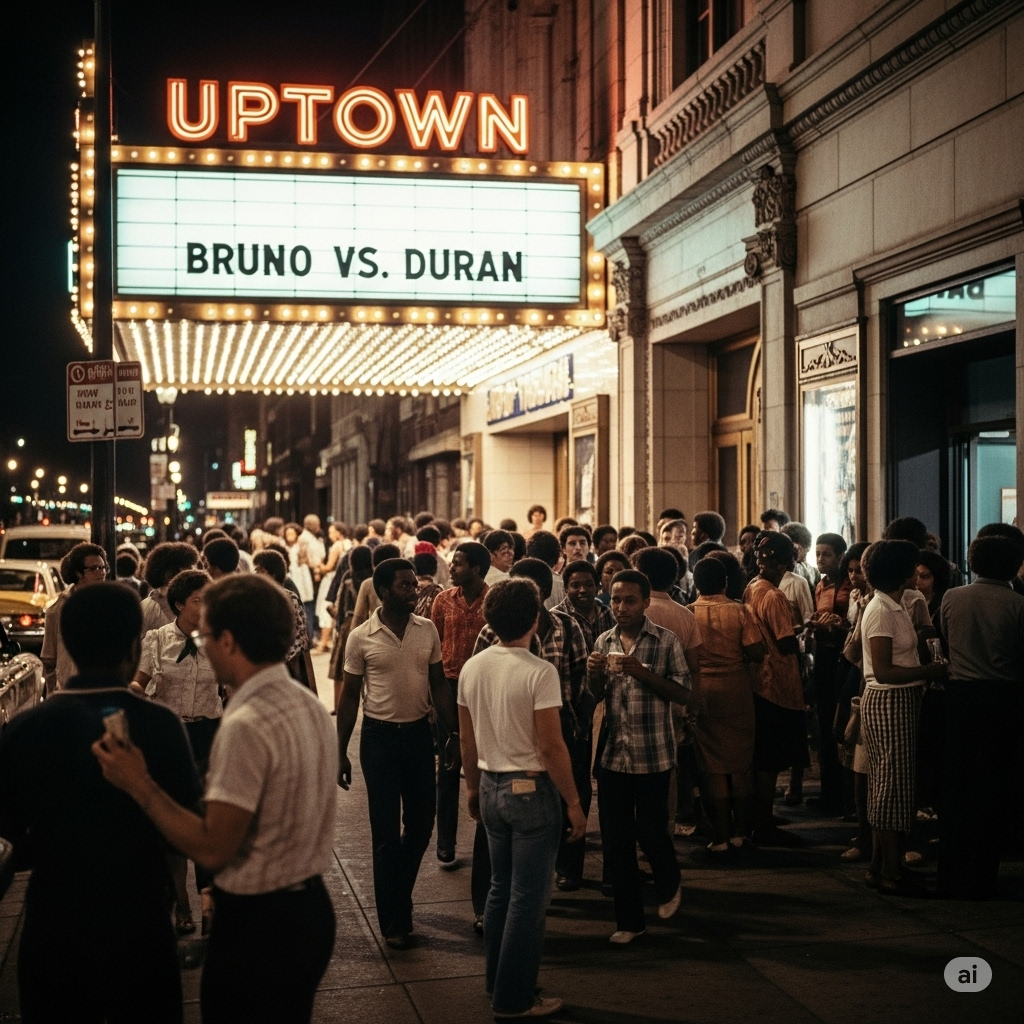
¶The criminal investigation that suspects mafia boss Busbee "Don Antony" Pistacchio (Tellatoya family) sponsored illegal maritime deals, is thisclose to a fruitful conclusion before attention is abruptly shifted.


 Now, GO's leader, Aegypt, has been branded as Public Enemy #1, even though his version of Black empowerment - dubbed "Brotherly Love" - is virtually harmless and would actually be beneficial to the community at-large.
Now, GO's leader, Aegypt, has been branded as Public Enemy #1, even though his version of Black empowerment - dubbed "Brotherly Love" - is virtually harmless and would actually be beneficial to the community at-large.
 Alven's young pregnant wife, Norma, craving more masculinity from her marriage, is now torn between loyalties to her husband's ambition with 'Bruno' and her own ambition within GO, thereby creating a costly melodrama.
Alven's young pregnant wife, Norma, craving more masculinity from her marriage, is now torn between loyalties to her husband's ambition with 'Bruno' and her own ambition within GO, thereby creating a costly melodrama.
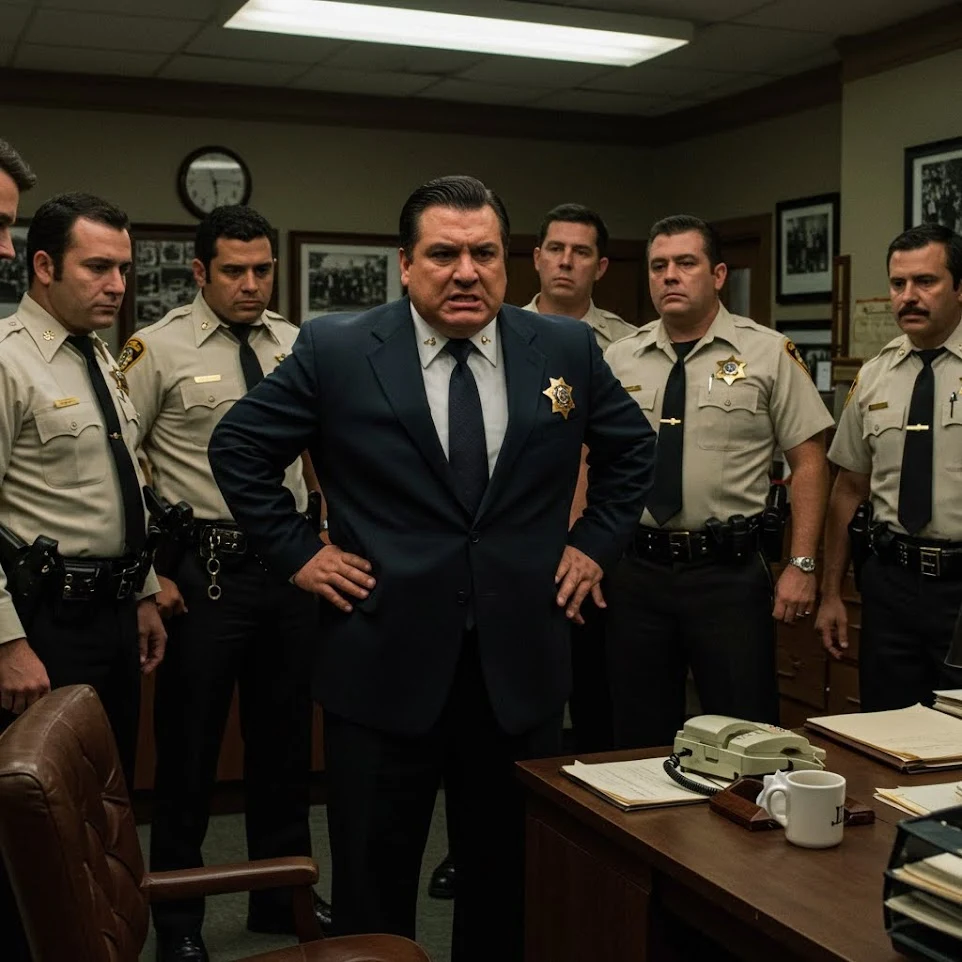
"Ultimately, strength prevails. -- There is no balance of power. Equality is a myth, and rather boring." - Ember Libitina

¶Local law enforcement is strained under newly appointed district attorney Ember Libitina because of an obsession with Aegypt; she plays dirty and her 'tough on crime' stance may prove to be irresponsible jurisprudence. Her office has seemingly ignored peril in the rest of the City to focus ruthlessly on Aegypt, an eccentric freedom fighter whose community-building efforts are taken to be a direct threat to the Brandywine Police Department. Aegypt is rebellious against law enforcement and high-technology, but not in a demonstrative way; he'd much rather tend to his 'anti-pollution' lifestyle with his followers in their own small section of town.


His group, GO, recently purchased a block of houses in the university district, and are intent on converting those into a spiritual health cooperative for Black people. GO's ideologies speak to racial harmony and financial discipline for all, but city codes are intolerant of communals boarding convicted criminals.





¶Somebody has called for wholesale assassinations as the BPD attempts to evict GO and serve arrest warrants, but is met with self-defensive crossfire.


In response, bombs are dropped in a residential area, resulting in death, destruction, and lies./// In the storyline, Ember Libitina is a hold-over from the Mayor Luigi era in Brandywine; an indirect characterization of an almagamation of late-20th Century Philadelphia District Attorneys [DA] (after whom she was loosely modeled).


¶Now in her eighth decade of life, the Attorney General Emerita sees this special election in which she is running for re-election as the culmination of all of her works and possibly her last chance at abusing said coveted office. It's a credibly odd circumvention, but the mayorship of Brandywine caps the efforts of a distinguished legal career and satisfies her public ambition. As the state's former top cop (she transferred from Steelerville to work in the Brandywine DA's outpost for sake of convenience), Ember - who is notoriously "tough on crime" - seeks to re-assert the 'natural order of things' throughout and around the town. Her campaign/tenure is based on adjectives such as reform, gentrification, safety, and progress. She is definitely "in it to win it".


{The backstory part (1978) is based largely on historical fiction, so we defer to real people of that time.
¶Frank Rizzo's tenure as both Chief of Police first and then mayor, was marked as being full of strife and animosity towards Philly's African-American demographic. It may be difficult to gauge his impact today considering the national political climate in aftermath of the Obama presidency and so forth, but he remains a towering figure that may have set a precendent on how to 'handle' crime and criminals in large American cities.}


¶I actually couldn't tell this story without Ember. One, as the incumbent mayor, she needs a worthy challenger (Curran) in the runoff election that's taking place, and two, in order to keep things from spiraling out-of-control, Maundy's overbearing authority has to be challenged by an adversary from the political sphere. It just does.

¶This situation (the distribution of Mr. Alphabet's intra-city investment) lends itself perfectly to a winner-takes-all 'Battle for Brandywine' that nobody can actually win. The ever-so-sharp Ember shows us that people's migrant behavior is recycled from patterns of economic health [ie. roughly every two (2) decades or every other generation, the wealthier class relocates back into the city for jobs/employment+transportation before saving their money and moving to the suburbs]. This is an important note and plot point, as we see that residential stagnation is a detriment and impossibility where there exists youth.

¶One civil mishap has led to another in recent outings (eg. police shootings → arson/riots, bombings, landscape defacing, etc.), and Libitina requests the personal protection and repute of none other than Pascha himself to assist her in navigating this extremely intense social climate as she makes her campaign rounds. He obliges with reservation, suspecting there is more to this assignment than meets the eye. He's probably right; given enough time and resources, we see that the true nature of the beast is to rule.







¶Due to his background of investigative work in the private sector, Egg Pascha - employed as a double agent private eye - had been personally courted by Mayor Luigi to surveil the group and monitor its movements as the uncouth executive mobilizes the police force whose brutality further disturbs the peace, leading to factions erupting into a self-destructive warzone in which Pascha finds himself in the middle of.



Because of the assignment, his espionage has him feeling like a traitor; the wife of his colleague, Alven - who is also his fraternal brother, is a member of GO, and the three of them are part of a band that has advanced to the finals in the local talent show. He must now ask himself if it is worth risking his one shot at making it big in Hollywood? The answer to this question will shape the rest of life.
"I've lived a long, normal life. Like you, I used to be overwhelmed with sadness when people died. Stay in law enforcement👩✈️👩🏾⚖️ long enough, and we all come to the same satisfying conclusion: criminals make it easy to see that not everyone wants or deserves to live." - Ember Libitina

¶Certain persons within GO, refusing to relinquish their freedom and liberties, become reactionary after being backed into a corner, and start to behave as they see fit. Never liking or trusting Pascha, anyway, an especially frightened Norma defends herself by pushing the limits of the law to include manslaughter. Her supportive sibling, Dominique, devises a way for the family to circumvent the legal system, but not before she and her unborn child are seemingly unalived by Egg Pascha.

This act immediately impacts the relationship between the comrades, even though Pascha swears to Alven that it was somehow an accident and maintains his innocence. Either way, it happened on his watch, so he has to live and die with that guilt.
¶On the brink of stamping a ticket to a new career, Egg Pascha and Alven together must prove their mettle in a daring, action-packed deep sea rescue mission


stemming from an active terrorist attack on the Salem Nuclear Power Plant in New Jersey


under the cover of the region's worst seasonal weather in years.



The future can only accept one of them after this figurative and literal storm calms down, and they each know this. During a haywire aurora borealis, their loyalties will be tested as Egg Pascha comes in radio contact with a bizarre figure who offers information that aids in solving "cold cases of yesteryear".

¶Secret exploration plans (via NASA Voyager program) are in motion to probe 'Wormwood' - a recently discovered celestial object orbiting planet Neptune. The applications of said event provide an enormous opportunity for technological advancement, but for whom? Something about the Year 2049. Hint:


¶In the meantime, a major shipbuilding magnate by the name of Maundy Lindros lurks around the city government,


"I'm a competitor. Winning adds value to Life. Losing is a choice, and a poor one. You deserve what you let happen to you." - Maundy Lindros
 flaunting her industrial-strength money and changing Brandywine's political landscape with her bribery and ambitions; abusing her status to essentially buy controlling seats on the City Council. Via her business, Lindros FlyerCast and Irons, Ltd., she recently acquired the Philadelphia Naval Shipyard + Pennsport as a permanent base upon relocating from Port Richmond, and brought some steadyhands with her, including the disposable Dominique
flaunting her industrial-strength money and changing Brandywine's political landscape with her bribery and ambitions; abusing her status to essentially buy controlling seats on the City Council. Via her business, Lindros FlyerCast and Irons, Ltd., she recently acquired the Philadelphia Naval Shipyard + Pennsport as a permanent base upon relocating from Port Richmond, and brought some steadyhands with her, including the disposable Dominique
 Dominique Noah, neighborhood imam[description:= Black male, late-60s years (mid-20s years in 1978 flashback) /// character:= he can preach until the moon turns blue, but secretly is deep-down tired of the choir itself, embittered, lately finds himself babysitting Tharbis' kids, originally from Newport News but 'caught up' in Pennsylvania, he's been waiting for someone like lnq👨🏿🦱 - who he views as a prophet - to come along .. perhaps as a means to hide his own dark past, hardcore, a real G who can get whatever you need as long as you don't ask how he got it, modeled (indirectly) after the myth of the Brothers Stewart]../// A deep dramatic work is almost for naught if it doesn't have a proper epsilon. Here, this is the dual role(s) of Maundy - the mastermind behind all of this chaos that's been going on in Brandywine during this turbulent election cycle - and Ember, a treacherous prosecutor.
Dominique Noah, neighborhood imam[description:= Black male, late-60s years (mid-20s years in 1978 flashback) /// character:= he can preach until the moon turns blue, but secretly is deep-down tired of the choir itself, embittered, lately finds himself babysitting Tharbis' kids, originally from Newport News but 'caught up' in Pennsylvania, he's been waiting for someone like lnq👨🏿🦱 - who he views as a prophet - to come along .. perhaps as a means to hide his own dark past, hardcore, a real G who can get whatever you need as long as you don't ask how he got it, modeled (indirectly) after the myth of the Brothers Stewart]../// A deep dramatic work is almost for naught if it doesn't have a proper epsilon. Here, this is the dual role(s) of Maundy - the mastermind behind all of this chaos that's been going on in Brandywine during this turbulent election cycle - and Ember, a treacherous prosecutor.
¶When I wrote the first incarnations of Maundy, the character was actually an obese male; I had a stereotypical Mediterranean mob boss / crime overlord in the mold of Vito Corleone (or Wilson Fisk). That idea was at first discarded because I thought the world needed to move away from over-subjugating certain persons, and because we've already seen that done many times over. ... and because this part of the storyline didn't have a place to fit such a gangster's history; a requisite for understanding what makes someone like that tick. That was an honest error; I was later seduced to the realization that Cosa Nostra is a credible subplot, so it was re-spawned into a different character.

¶Really wanting to surprise my audience, I then rewrote Maundy as a cultish elder, but again, too stereotypical; almost borderline tinfoil hat stuff. The easy fix was to just change the gender. Women and their motives (especially in the company of men) tend to be much more difficult to follow on screen/stage when all the audience is given is a few minutes with them. Men are simple to gauge; we have a small menu. Women, on the otherhand are usually (not always) in supportive roles (in the company of men), meaning that there is a lot more on their plate that they're actually dealing with when it comes to keeping waters calm.
¶Maundy's that person. She is a monster in her own right, though her sophistication will not allow her emotions to devolve into a savage like lnq👨🏿🦱; nibbling on an oppressive spice like most would-be miscreants is beneath her.


¶Instead, she's had plenty of time to seduce and manipulate those she needed to to get where she wants to be. Those can be the toughest people to read since you're inadvertently part of their plans. Avarice is her basic instinct. Because she represents absolute power, this character needed to be larger in scope than everyone around her; so slick that we feel we may be dealing with the embodiment of the 👿Devil Herself.

¶What was demanded was an instant declaration of character. In 1978, the Navy Yard in Brandywine is 'undocking'; having practically been de-commissioned since its last ship was built some eight years prior, the U.S. Military has begun organizing plans to transfer ownership of the grounds to the highest private domestic bidder in an effort to stave off foreign competition towards the end of the Cold War. The opportunistic Port Richmond-based tycoon, Maundy Lindros, has caught wind of the sale and wants to expand her dealings in the corridor. This sets Maundy against the baroness Lambsimon from France in an intense bidding war for the real estate.



¶This happens to coincide with the August 1978 GO incident in Brandywine, where an off-shoot of young Black freedom fighters were brutally and wrongfully attacked by the city's government, leading to historians attributing it - and the similar 1985 massacre on the group by the same police force - as full-fledged racism; reminiscent of the slaughtering on 'Black Wall Street' in Tulsa, Oklahoma. These events made national news, by the way, and are sensationalized in this piece.
¶I have artistic license here, and use it to make Maundy a vital shaker in bringing about the creation of so-called 'Meroë' (aka 'East Philly, it doesn't actually exist, but is crucial to the storyline); the aftermath of the White-on-Black aggression calls for land grants within city limits to be designated to an intentionally segregated-but-equal Black class as compensation for / compromise of agreed-upon faults. This action was spearheaded by Maundy herself in the intervening seven years, resulting in the planned community of 'Meroë' (what local bigots deemed 'Niggerville').

¶Of course, this just happens to be constructed on the wharf that the Lindros company wants ownership of, so city permits surreptitiously fall in her favor. Allthewhile, she manages to prey on people's seemingly natural fear + distaste of Black folk to her advantage, relying on that to keep would-be aggravators at-bay while giving her a headstart onto her true ambition.
¶When we meet her in Die, Detective!™ (the work's prelude = the year 1978), we immediately know who sets the tone. A coastal Virginia-born+raised aristocrat instilled with a sense of noblesse oblige (although you wouldn't at first guess this from her affection for cowgirl boots👢), she runs things without titles. Blind (born with optic nerve hypoplasia) - yet visionary - and mute, she's deignly mastered the secret to being in two (2) places at once - by having your DNA all over the place (and holograms). We're not afraid of her, we just would rather not deal with her if we don't have to.

¶Possessing a genius IQ🧠, she has applied it masterfully to naval🛳⚓ architecture. Her enterprise (to which she was a legatee), Lindros FlyerCast & Irons, Ltd., was instrumental in building and bringing the first fleet of slave ships to Rhode Island's wharves (I made that up, there's no real historical significance. Wink😉 to the Swedish surname.), and today controls the regional (Brandywine-Bay of Virgin Peake corridor) seaport for all merchant maritime freight (shipping, shipping containers, shipping container housing, terminals/docking vessels, and so forth).



¶By proxy, her company is also the de facto operator of the Brandywine Water Authority (+ global desalination technology subsidiaries), largest developer of The Shipyard, holder of the Brandywine Gas Company, mutual owner of SPEC (Southeastern Pennsylvania Electric Company), silent majority stakeholder in the Panama Canal Mortgage, and financier of the Thanks Endowment.
¶She doesn't know it yet, but her heavy investment in Securitas AB is about to look more prudent (and dangerous at the same time), thanks to the hiring of Pinkerton consultant Gunyo Gruber.
¶Like with any control freak, she's grounded in materialism, because to them, possessions are tangible realism. That's what's scary about her; she's bureaucratic, not political.
¶For reference, Maundy's full name is Maundy Lindros. The name comes from 'Maundy Thursday', retaining Easter nomenclature. -- Trivia: "Maun-" is derived from Old Norse; akin to Olde English "gemynd", meaning 'think' or 'intellect'. The name 'Lindros' was chosen in honor of of Eric Lindros, who played for the Philadelphia Flyers hockey🏒 team, that's also where the name of her inherited business (Lindros FlyerCast...) comes from. -- She has no siblings, never married, and is childless. We can conjecture that because her traditional parents may have been somewhat disappointed by having a physically disabled/handicapped kid, they decided to not bring any more children into this cruel world, and instead, dedicated all of their resources to her development, which may explain her heightened senses, genius, and work ethic. Her zodiac sign is Pisces♓👍.
¶The first ban on slavery anywhere in the American (New England) colonies was passed on May 18, 1652 in the territory of what is now Rhode Island. Since this is fiction, anyway, we may assume, for good measure, that the Lindros family - perhaps upon Quaker conversion after its Pennsylvania settlement - may have had something to do with the passing of that code.


¶She really is untouchable. Throughout most of the story, we rarely get to see her in the flesh; she uses holograms exclusively. A diabolical recluse who seldom docks for anyone, Maundy (in the vicinity of her bodyguard/captain/pilot, Lef'fut) resides on a Class A submersible, the Drebbel, that often deep cruises somewhere nearby in the Atlantic Ocean, probably in a bay off the coast of New Jersey. -- Heck, I wrote her and I can't even pinpoint her location.🤷🏿♂️ -- This is to give a sense of how little she thinks of both the limelight and people on land, and the baggage each brings. Allergic to stress (her philosophy for living a long life), she takes great precautions to ensure her well-being.


¶On the business side, she runs Lindros using encrypted holograms with keyboard⌨️ input. The corporate office occupies an ⚓anchored converted corvettes on the shipyard, and is managed by her assistant, Lily. It also operates mineral mining camps in Arrow Bow County, Elsewhere.


¶In addition to being the world's premiere distiller of argon, Lindros is the largest importer of phosphate from Morocco in the Americas. A subplot is that Brandywine's Islamic☪ demographic (spearheaded by her North African Muslim community) wants her company to pay retribution for unfair trade practices between the two countries, and a sizable number of Moroccan mobsters have sprouted inside the City and around the Delaware Valley for this very purpose. To protect her wharf from local mob threats, she employs on-again, off-again imam, Dominique.

¶In the present-day, when the world's richest person, Mr. Alphabet (Dwight Mann), comes to town seeking a second headquarters for his Portsmith, Oregon-based e-commerce firm, Nile LLC, part of the requirements for its new station are that those utility companies being privately held by Lindros be returned to the public sphere. That's billions of dollars in annual income for her potentially at-risk. Couple that with the fact that Mr. Alphabet's business is also in shipping by default (commercial freight: trucking, cargo drones, air, and rail🚆), and has selected Brandywine because of its location and proximity to overseas handlers, things aren't boding well for our heiress. As a precaution, she initiates the 'ArC Project' [NOAH].




¶Since 1978 when she strong-willed the then-city council to turn over the utilities into her private hands, she's made a vast fortune, acquired extraordinary influence, and become a menace to the jurisdiction, especially the District Attorney's office. Now things are coming full circle for her, but, she is composed, insightful, and vastly as resourceful in her own right. We'll see how this plays out.
¶There is a serial killer on the loose in Irish Charm that is giving local agencies fits. In an area reputed for its down-and-outness, for some reason, certain city officials all of a sudden seem to care an awful lot about its stability. But, if you listen to these politicians tell it this election season, "Poor people vote, too.".

¶Additionally, aggressive geopolitics has taken center stage, and Maundy's company has been tasked with handling very peculiar seafaring requests from the United States government (particularly the Departments of Homeland Security and Defense). Namely, legislation is floating around on Capitol Hall (yes, that's correct. Keep reading.) that would call for - if passed - the annexation of Liberia as a territory (the country was formerly an American colony in the Nineteenth Century).


¶This is being done under the guise of re-establishing dominance on the African continent to counter growing influence/threat from China and India. But, with all of the current domestic racial strife, we can't be too certain of the motive considering that Lindros has been contracted to build a superclass frigate and a fleet of vessels that transport 'human cargo at-scale'. -- The four-fold arc of the show begins with its first chord,
N. The other three (3) chords, in order, are O, A, and H. Her being in shipbuilding invites you to assume that the remainder of the work has something to do with that element of religiosity. By ChordN (the start of Holy Week), her mettle is tested, and we'll see just what she is all about.


¶Basically, the whole story centers around her, as told from interactions with our eponym (focusing on his point-of-view, which is necessary since he is the random walker). To some degree - and on a very high-level, the entire piece purveys the rivalry between Maundy - who represents business + organization - and her adversary, Ember Libitina - who represents crime - (essentially leaving Pascha's angle relegated to being a punctual dramatic prop).
¶For the better part of forty-plus years, these two power brokers have formulated an ongoing mutual disdain for each other; engaging in a soft war of money versus clout. It has taken an outsider and an incredible event to align their singular objectives.
¶The tricky part about this character is that although, yes, she is the villain, she brings no intentional antagony to the narrative; (other than her younger self's direct involvement with Egg Pascha's reformation) she is not the sworn enemy of our protagonist/antagonist. Yet, the ebb+flow of her executive decisions pretty much entangles everyone in her web🕸. For comparison, most people assume the xenomorph is the villainy in the Alien franchise, but, if you think about it, the android is the real villain in each outing. The xenomorph was engineered as a virus programmed to do nothing more than re-populate; whilst the android was created by The Corporation to retrieve said virus so that it can be used as a biological weapon. Being a non-biological humanoid, it slyly blends in with its crew, only to willingly let the crew be murdered in order to fulfill its objectives. Humans, then, would become equal parts host and parasite. In either analysis, the xenomorph and the android are both 'aliens' on a mission solely for self-preservation, which is exactly the mindset of Maundy.
¶Good and bad are points of view, and Maundy embodies that idiom. She is by far my favorite character in this. When writing her, I found myself cheering for her at parts because she's the rare individual with a grand plan and the determination to execute on that plan. She doesn't shy from her sentiment that Egg Pascha went and started some shit💩 and now she's got to finish it.
¶A lot of people dream of something and want it to happen - their hubris even leaves them with the expectation of it happening, and then there are the very few that actually make it happen. In that regard, I liken her to a particular former American Vice President. Maundy made bold bets in her youth that paid dividends; she trusts her instinct and is usually always right (to paraphrase Donald Trump: successful people tend to only listen to themselves). Our girl is a boss; a gangster's gangster.


"'Change and hope' is a fallacy. The only way to rectify anything is to start all over." - Maundy Lindros
¶Swift-acting, Maundy's considerable wealth and intelligence has afforded her extraordinary influence, which she uses to seize the power vacuum and broker a recompense deal with the jurisdiction's Black (B1/ADOS/FBA) demographic that leads to the creation of a new sector - called 'Meroë' - for the City's transgressions against GO;


a chess♟️ move in her designs of iterative power acquisition. On paper, this district's main function is to act as a separate-but-equal establishment to carry-out Aegypt's would-be vision. But in reality, it's re-purposed as a proxy for Lindros' secretive business dealings. Coincidentally, Lindros was Pascha's employer in Bethlehem, PA before he too settled in Brandywine with an undiagnosed early onset of Parkinson's disease (probably contracted from the jobsite) that has only exacerbated since.

¶All of these characters pull our Coastie in directions that overlap each other, making for a fascinating documentary for personal gain by the novelist Junior Mayne in his soon-to-be-released (1979) exploitative anthology titled, 'Gumshoe, Neverlasting'.


--------
"Bad Habits" (synopsis)

(suite: Lent - Easter Sunday, present-day ["Chords N-O-A-H"]) - The entity named 'SAINT BERNARD' (SB) has made a number of under-the-table deals over the course of the past few months with religious sects worldwide to force the prophesied Third Temple's erection.


 Meanwhile, a worldwide pandemic in the form of a viral neurotoxin (biowarfare?) has crippled the global economy, and the anticipated aftermath of a recovery has sparked fears of a hegemonic shift between the Western and Eastern hemispheres; potentially resulting in a clash of cultures and an inevitable world war.
Meanwhile, a worldwide pandemic in the form of a viral neurotoxin (biowarfare?) has crippled the global economy, and the anticipated aftermath of a recovery has sparked fears of a hegemonic shift between the Western and Eastern hemispheres; potentially resulting in a clash of cultures and an inevitable world war.

 SB's deliberate attempt to invoke the Second Coming tickles the diabolical beaks of war hawks, but not without consequence.
SB's deliberate attempt to invoke the Second Coming tickles the diabolical beaks of war hawks, but not without consequence.

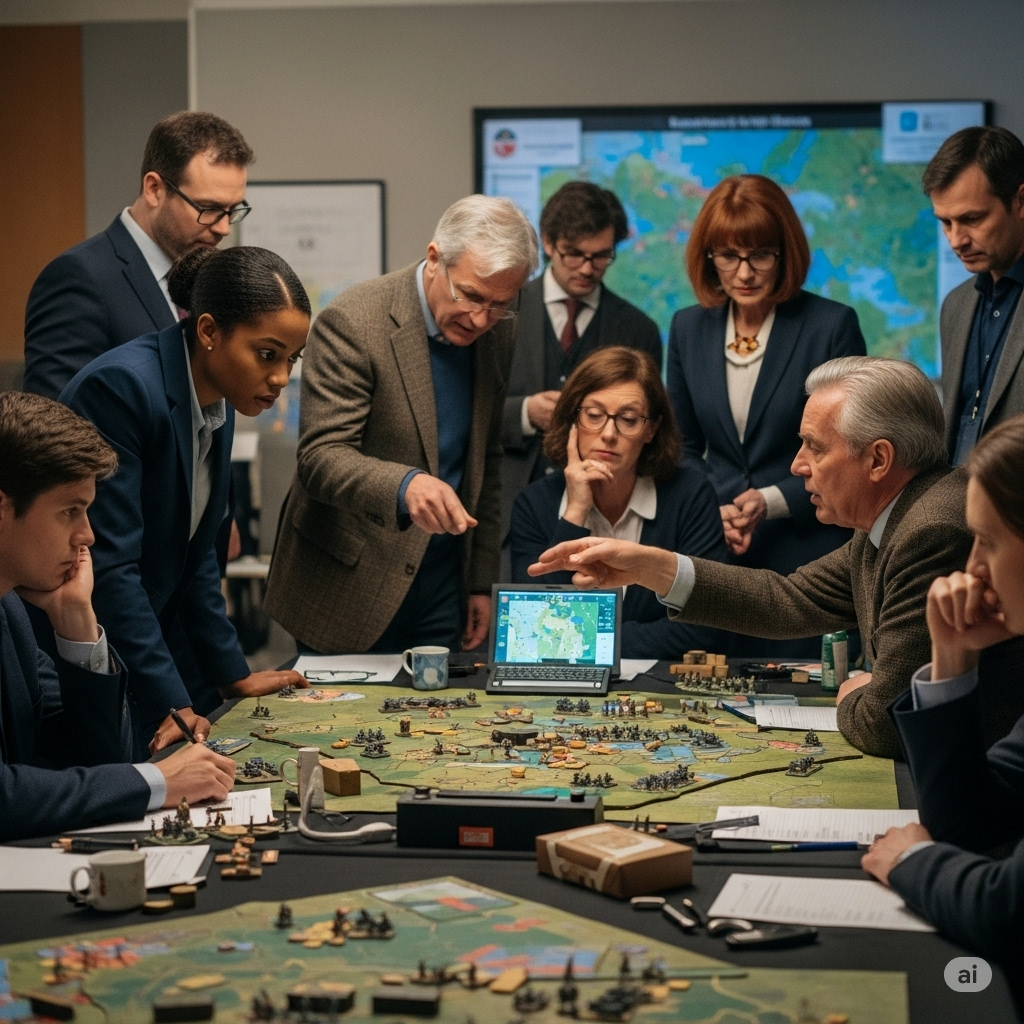
¶The United States is entering a recession amidst a hemispherical pandemic as Congress teeters with unsolicited countermeasures against the volatile Eastern Bloc, threatening Armageddon.

 For all it's worth, the Russians have played their cards right:
For all it's worth, the Russians have played their cards right:
 they correctly bet that starting another relatively minor invasion with her neighbor would cause NATO to react by picking sides with and blindly supporting the opposition, thereby delivering economic inflation in those countries, to which voters would swing the pendulum back to neoconservatism,
they correctly bet that starting another relatively minor invasion with her neighbor would cause NATO to react by picking sides with and blindly supporting the opposition, thereby delivering economic inflation in those countries, to which voters would swing the pendulum back to neoconservatism,




 headed by Kremlin operatives posing as darkhorse influencers who favor so-called 'democracy'. In short, traitors have convened in Washington, and now the 3+1 branches of government can no longer trust each other until things get sorted out.
headed by Kremlin operatives posing as darkhorse influencers who favor so-called 'democracy'. In short, traitors have convened in Washington, and now the 3+1 branches of government can no longer trust each other until things get sorted out.

¶A lifetime of scheming landed her in bed with Beltway cognoscenti and a slough of other D.C. elites, all of which enabled mayor Ember Libitina to maneuver her penultimate power play: fracturing the District of Columbia.




 House Speaker Henza Turtl is pressuring Lindros to modify the company's payloads in order to accommodate an expected wave of asylum seekers relocating to the Delaware Valley,
House Speaker Henza Turtl is pressuring Lindros to modify the company's payloads in order to accommodate an expected wave of asylum seekers relocating to the Delaware Valley,


underhanding a batch of new legislation on 'Capitol Hall' (a synedoche for the ruling frame stationed at offices transferred within City Hall now that the nation's capital resettled [1790-1800] to Brandywine temporarily since the infrastructure / structural integrity of Legislative Branch edifices in the District have been jeopardized) that can have serious societal repercussions.




¶Maundy's personal gamble on 'Meroë' (fictional East Philly, modeled - in spirit - after historic Greenwood, Tulsa, Oklahoma) has paid dividends,


 but the maturity of the compromise came with a clash of social residuals (eg. home rule, self-sufficiency) that even she didn't anticipate, especially the reactions from the regional crypto/energy-dealing kingpin, Theo.
but the maturity of the compromise came with a clash of social residuals (eg. home rule, self-sufficiency) that even she didn't anticipate, especially the reactions from the regional crypto/energy-dealing kingpin, Theo.
"It's never enough to be one step ahead; you have to stay in-stride. Do the math. I'm the theta in the equation; they weren't expecting me." - Theo


In response, she finally activates/initiates her long-brewing clandestine "NOAH" plans ('ArC Project') - an underwater argon-powered vessel meant to later dock off-world with an already-orbiting miniature probe in Neptune's atmosphere.



¶Suffering from massive hallucinations (including prosopometamorphopsia and visions of the ghost of his eight-years-dead ex-wife haunting him) which have left him as his own worst enemy, old man Egg Pascha has reluctantly returned to Brandywine to receive clinical care for his neurodegenerative diseases.


Being the victim of identity theft, a personal wish is granted as his past heroics seem to go unnoticed;
 only his true friend is willing to vouch for him on his behalf as hardly anyone recognizes him anymore (or is it the other way around?).
only his true friend is willing to vouch for him on his behalf as hardly anyone recognizes him anymore (or is it the other way around?).
¶Having reverted to his role of private investigator, the deal is that he volunteer with the U.S. Coast Guard Auxiliary (CGAPD) in exchange for both therapy and record expungement (namely, waiving a prior dishonorable discharge and thereby receive his full pension, in addition to getting health benefits that include copay treatment [L-DOPA] for his Parkinson's/diabetes package),
 while reporting intel directly to mayor Libitina for her protection because an obstinate bias towards a nonsensical "conservative liberal" agenda has proven to be too divisive during her trying re-election campaign against police chief Curran and an unexpected groundbreaking third-party candidate in a race that would put its winner in a position - perhaps not as the country's figurehead, but its de facto leader - having obvious federal implications. As a favor, he is prescribed a military-grade high-tech companion gadget, 'Stuart', aiding in his treatment. Additionally, the detective is assigned an understudy, Bunny, who is revealing herself to be trouble. Together, their job is to help rein in Theo.
while reporting intel directly to mayor Libitina for her protection because an obstinate bias towards a nonsensical "conservative liberal" agenda has proven to be too divisive during her trying re-election campaign against police chief Curran and an unexpected groundbreaking third-party candidate in a race that would put its winner in a position - perhaps not as the country's figurehead, but its de facto leader - having obvious federal implications. As a favor, he is prescribed a military-grade high-tech companion gadget, 'Stuart', aiding in his treatment. Additionally, the detective is assigned an understudy, Bunny, who is revealing herself to be trouble. Together, their job is to help rein in Theo.
 ¶Bunny is a studly NCIS officer who is fresh off the murder case of Felix Yota that she just helped solve. There is a new assignment for the talented young officer who is being quickly promoted through the ranks of the Coast Guard Investigative Service (CGIS): a dragnet is on for "Theo", the mid-Atlantic's most dangerous gang leader.
¶Bunny is a studly NCIS officer who is fresh off the murder case of Felix Yota that she just helped solve. There is a new assignment for the talented young officer who is being quickly promoted through the ranks of the Coast Guard Investigative Service (CGIS): a dragnet is on for "Theo", the mid-Atlantic's most dangerous gang leader.
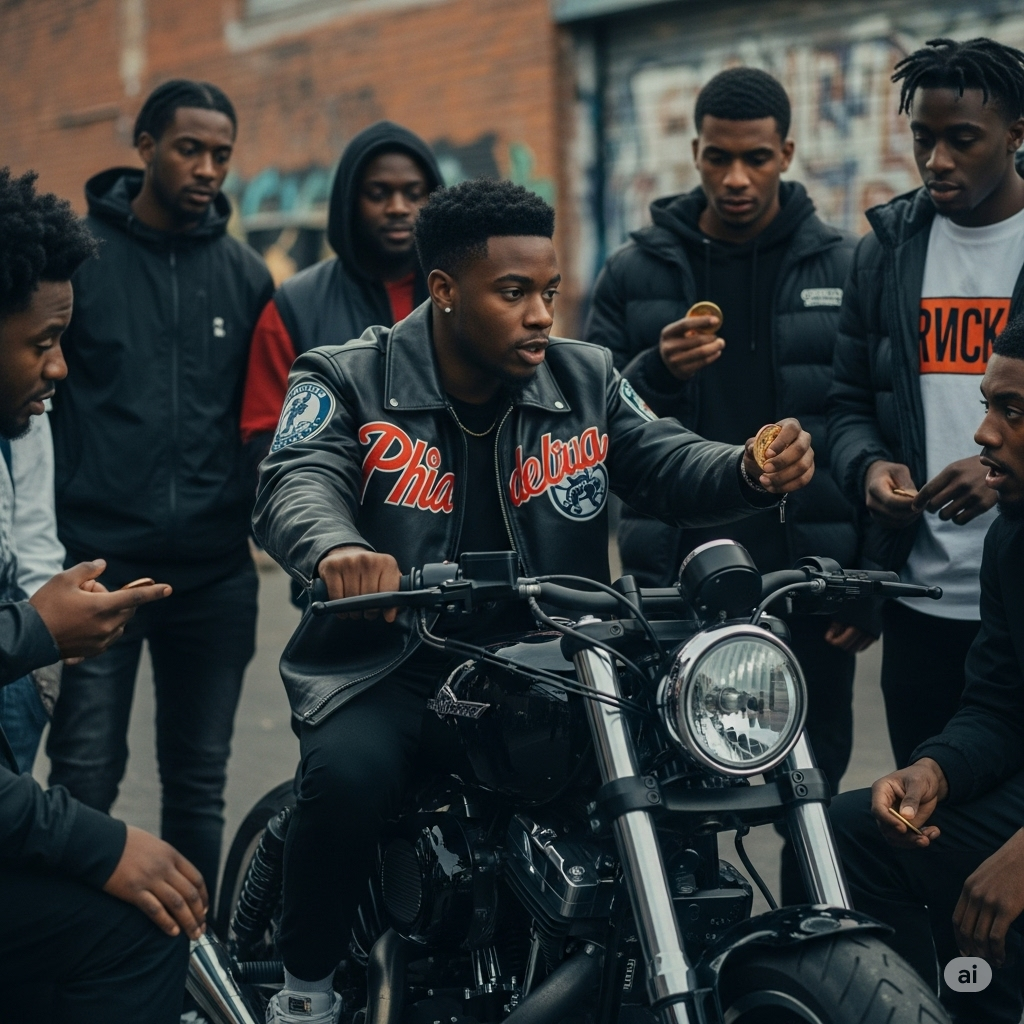 Bringing Theo to justice could lead to great rewards and coveted recognition that comes along with it. With the assistance of her connections to the city government and dubious ties to the criminal underworld, this shouldn't be a problem, and wouldn't be if she can just do things her way.
Bringing Theo to justice could lead to great rewards and coveted recognition that comes along with it. With the assistance of her connections to the city government and dubious ties to the criminal underworld, this shouldn't be a problem, and wouldn't be if she can just do things her way.
¶Pascha's medical condition and extended visit have become burdensome to his caretaker/guardian daughter this Easter holiday; to cope, Lily's busy schedule leaves little room for much else besides managing her work pod (herself + Gunyo + Earl Ellis), and she prefers it that way.
 ¶An old rivalry is rekindled as the mysterious Mr. Alphabet - the world's richest person - and his conglomerate, Nile LLC, steadily move into town from Portsmith, Oregon looking to build out its new corporate co-headquarters. As an unorthodox method for talent scouting, he has pledged considerable re-investment into Brandywine (the country's most impoverished zip codes)
¶An old rivalry is rekindled as the mysterious Mr. Alphabet - the world's richest person - and his conglomerate, Nile LLC, steadily move into town from Portsmith, Oregon looking to build out its new corporate co-headquarters. As an unorthodox method for talent scouting, he has pledged considerable re-investment into Brandywine (the country's most impoverished zip codes)



in the form of creating a city-wide tournament for artificial intelligence (AI) development - Philadelphia Artificial Lambda Model (PALM) {trained on 👨🏿🦱lnq's work from #8lnq, and the reason behind what sparks my character's involvement} in hopes of transforming her to become America's premier smart city,




an effect causing tribes to scramble for a piece of the sweepstakes. The local magnate, Maundy Lindros, feels that her business dealings may be threatened by the arrival of the new enterprise, and looks to act quickly. In opposition to her, the city's mayor, Ember Libitina, seeks to oblige the requests of Mr. Alphabet, which entails expediting cleaning up the streets of crime, poverty, and foul activity to go hand-in-hand with his investment.

 Maundy, who has puppeteered thugs and drug lords to do her bidding in the past, once again encounters her legal nemesis, except that this time - in the midst of an important political election season - the stakes are much higher. Meanwhile, Theo is on the hunt for city personnel who could thwart him. The Mayor's Office responds to the very serious potential challenges posed by the kingpin by placing Ember in the care of Pascha for the time being.
Maundy, who has puppeteered thugs and drug lords to do her bidding in the past, once again encounters her legal nemesis, except that this time - in the midst of an important political election season - the stakes are much higher. Meanwhile, Theo is on the hunt for city personnel who could thwart him. The Mayor's Office responds to the very serious potential challenges posed by the kingpin by placing Ember in the care of Pascha for the time being.
"Most things we want, we don't get, and the rest go somewhere else. But what we do get, is only what we need regardless of extravagance." - Dwight Mann (aka 'Mr. Alphabet')
/// The greatest mystery in the Universe is figuring out who (or what) is pulling the strings. Something a little more palatable may be unmasking who is really responsible for the actions of the infamous One-Percent [class]. -- That answer is much more simple: every person is ultimately responsible for their own actions (as long as they can keep their behavior in-check). A better question may be: just how far is the reach of our planet's most resourceful? To help us answer this (which is actually the subject of derivative position paper📄) is the enigmatic Mr. Alphabet himself.


¶Mister Alphabet (real name: Dwight Mann) is the world's richest person, by far (more than double in wealth of the next richest person on the list). With Brandywine ties (he possesses a Wharton MBA and a Princeton engineering degree -- I modeled him after Jeff Bezos, Elon Musk, and Robert Pera, and now you know🙂), this 👟tennis shoe-wearing, hoodie-sporting guru may also be one of its most intelligent. An extremely ambitious entrepreneur, Mann actually is a quite respected and rational leader as he heads Nile, LLC, a garage-to-megalith company that he built over the years. No one takes this guy lightly, and his business regularly makes international news almost with every acquisition, quarterly report, product announcement, and, most recently, search for additional office space.
¶Nile, LLC (considering that Mann is a Bezos business clone, if you put a little bit of thought into it, you'll guess that it is a nomen à clef of Amazon.com, Inc. [AMZN]) is looking to expand to accommodate its rapid growth. And by 'expansion', we mean construct a second headquarters. Already headquartered in Portsmith, Oregon, the firm is bent on planting new roots on the East Coast of the United States. After a three year bidding war between major cities (ie. New York City, Baltimore, Boston, etc.), Brandywine was declared the winner. One might think that because Brandywine is America's poorest big city[p], Dwight Mann would seize this opportunity to make a very public altruistic splash for uplifting American hardship, but nope. He's not a philanthropist, and I doubt that he ever will be. His angle in this is all business; his business.

¶Being in cargo shipping, Nile is hoping to land some major government contracts where Washington is concerned in order to keep its freight division active overseas. Brandywine is a proxy that offers interesting ports at affordable prices (since the U.S. Navy abandoned the dock -- which is actually not entirely true, but works well in this fictional storyline). To acquire it, lots of back door deals had to be made using the mysterious pseudonym "Mr. Alphabet", as prices undoubtedly would have rocketed had sellers known who the buyer actually was if the truth came to light (kind of reminiscent of the actions Walt Disney took in the 1960s to quietly purchase up grove land in central Florida in what would become Walt Disney World). Instead, to preserve the deal (which involves a very, very large investment in the City over a five-year period), favors were called in by some unscrupulous individuals, as you can imagine.
¶Meddling in municipal business, the tycoon has become a nuance to both Libitina and Lindros, having spent a fortune of his own cash in order to run the show behind-the-scenes. Taking a page from Maundy's old playbook,
 Mr. Alphabet also wants to use the Jersey peninsula as his personal playground; he's contracting it for his side hustle of launching rockets into low orbit to construct a worldwide network of telecommunications satellites.
Mr. Alphabet also wants to use the Jersey peninsula as his personal playground; he's contracting it for his side hustle of launching rockets into low orbit to construct a worldwide network of telecommunications satellites.



¶Allthewhile, teamsports of all avenues, is getting an overhaul from the conservative right-wing body politic that sees communal gaming being dominated by Black athletes as a public hazard. To elaborate, collegiate Black athletes are finally negotiating their self-worth (ie. superior "B-genes") at the pro-am levels,






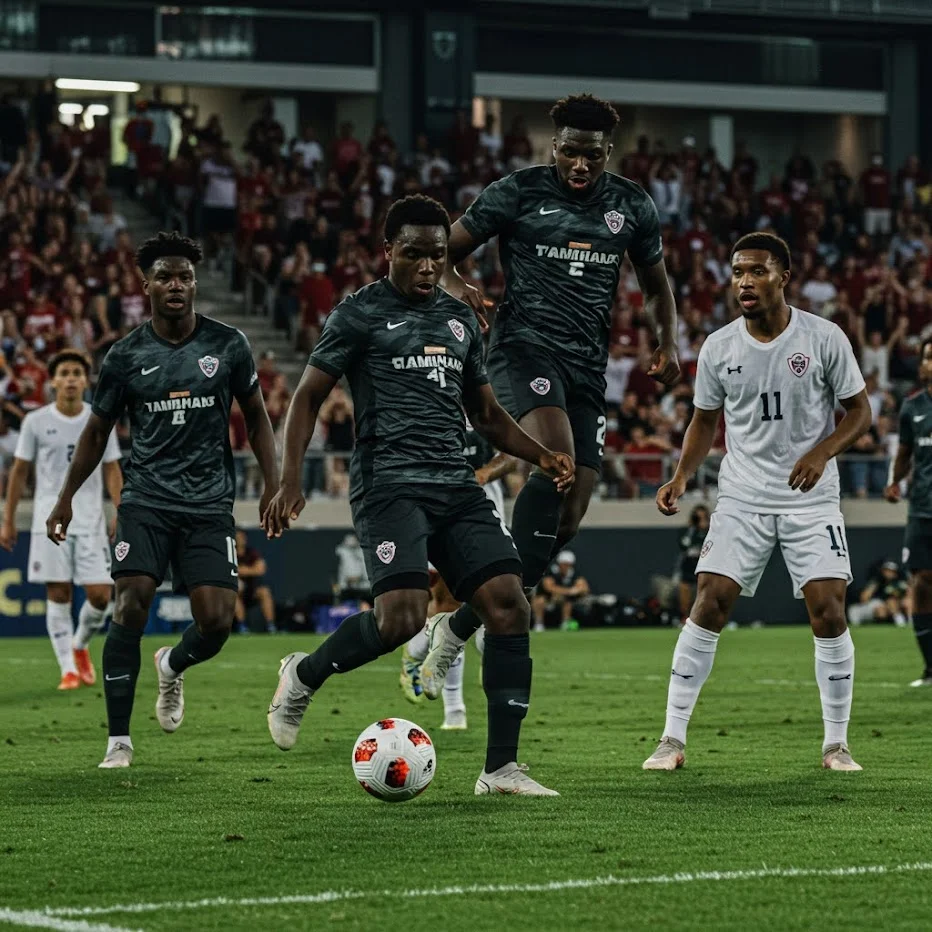



an innovation that tips the balance of the sports landscape by dramatically shifting the bulk of advertising revenues from PWIs to HBCUs. Now schools of the latter will have the funds to do quality research and development with competitive outcomes.




To stopgap the labor drain in an effort to maintain an advantage, conferences are modifying the rules in the 11th hour. More broadly, as an embarrassing admission that these changes take precedence, Speaker Turtl has, in response to the mobility, introduced legislation on the House Floor titled 'Cotton Chains Act',

 which aims to - among other things - reduce non-compliant subjects to non-profit status in the name of "education". Also snuck in the bill is a mandate calling for refugees from the Eastern Bloc to be relocated to Pennsylvania. Turtl and her pissed-off, jealous conservative cohorts have designs on "getting things back to the way they were"./// truth: Black folks have no friends nor allies, only admirers.
which aims to - among other things - reduce non-compliant subjects to non-profit status in the name of "education". Also snuck in the bill is a mandate calling for refugees from the Eastern Bloc to be relocated to Pennsylvania. Turtl and her pissed-off, jealous conservative cohorts have designs on "getting things back to the way they were"./// truth: Black folks have no friends nor allies, only admirers.









¶Compounding the chaos, a recent string of drug-related murders in the neighborhoods of Irish Charm has the authorities on-edge due to a slick+nasty serial killer with seemingly personal ties to Bunny.





¶In the midst of an outbreak that has quarantined large swaths of the population,

in a different section of town, there has been yet another sensationalized act of fatal violence committed toward an unarmed and presumed innocent minority at the hands of law enforcement, this time, they belong to Pascha's own partner, Bunny. Recently teamed with retired lieutenant Pascha (who is supervising as part of his community service exit interview requirements) for port security, Bunny surmises that the most opportune time to test the limits of her authority without askance will and has come while under the tutelage of one of the most controversial officers in this country's history.

On a routine traffic stop, and doubtedly 'fearing for her life', she opens fire on a seatbelted father and his young daughter, killing them both.
 With no witnesses other than an unwitting Pascha, the precincts and city are left with the difficult task of explaining and defending this tragedy to the public. Questions arise: is there innocence in this case, and where to place the blame? -- and are answered quickly: blame is placed squarely on Egg Pascha, framing him. Furthermore, because of what appears to be a curtailing of a kingpin's business dealings, a hit is put out on the detective's life, endangering him. This miscarriage has put the whole country - already fragile from previous similar occurrences - on-edge.
With no witnesses other than an unwitting Pascha, the precincts and city are left with the difficult task of explaining and defending this tragedy to the public. Questions arise: is there innocence in this case, and where to place the blame? -- and are answered quickly: blame is placed squarely on Egg Pascha, framing him. Furthermore, because of what appears to be a curtailing of a kingpin's business dealings, a hit is put out on the detective's life, endangering him. This miscarriage has put the whole country - already fragile from previous similar occurrences - on-edge.

 Unfortunately for said law enforcement, the difference between other jurisdictions and the City of Brotherly Love is that she lives up to her reputation as being the most blue-collar, no-nonsense town in America, totally intolerant of brutality towards its citizens by those who have taken an oath to protect them.
Unfortunately for said law enforcement, the difference between other jurisdictions and the City of Brotherly Love is that she lives up to her reputation as being the most blue-collar, no-nonsense town in America, totally intolerant of brutality towards its citizens by those who have taken an oath to protect them.
 They have social media and a backlog of public case studies replete with examples of no justice being brought to officers in the courts of law. Where there was hope and maybe even expectation of a drawn out trial that could potentially result in an acquittal, certain neighborhoods - exhausted from fighting for very limited resources, have other plans for dealing with the perpetrators and the interrelated corrupt justice system.
They have social media and a backlog of public case studies replete with examples of no justice being brought to officers in the courts of law. Where there was hope and maybe even expectation of a drawn out trial that could potentially result in an acquittal, certain neighborhoods - exhausted from fighting for very limited resources, have other plans for dealing with the perpetrators and the interrelated corrupt justice system.





¶Egg Pascha's reputation causes this incident of police brutality to be pinned on our detective, sending the Black [B1/ADOS/FBA] demographic of the City spinning, and people are calling for his apprehension. Pascha is later arrested and must stand trial - not just for this frame job, but moreso for the mishandling of the Aegypt case (labeled "Easter" because it was filed on >March 26 of that year) in 1978 to which he has been tied. Unsatisfied, the People form militias and start an insurrection - reminiscent of the local Flying Horses riot of 1834, forcing the situation to devolve into 'Helter Skelter' in the midst of this already tough election climate.






 Even with a speedy in order because of deteriorating health, a mistrial looms and Pascha is bailed out of jail by his longtime buddy, Alven - who is in town honoring a widower's pact that tests his fealty to the max, resulting in the two of them becoming fugitives subjected to a manhunt during Holy Week.
Even with a speedy in order because of deteriorating health, a mistrial looms and Pascha is bailed out of jail by his longtime buddy, Alven - who is in town honoring a widower's pact that tests his fealty to the max, resulting in the two of them becoming fugitives subjected to a manhunt during Holy Week.

¶Enter lnq👨🏿🦱 (The Man himself, yours truly. ;).


"This world leaves the Black man with no choice but to dominate it." - lnq👨🏿🦱
¶In the wake of this, we have me (lnq👨🏿🦱) as a disgruntled civilian, who, having been disillusioned with authority after his own recent encounter with the legal system moved him beyond reproach, devises a plan to carry-out what he sees is the only logical solution to stop and prevent any further foul play against his community - the extermination of all police departments, fire stations, hospitals, regional National Guard, and the dismemberment of local officials (eg. those elected, ombuds, prosecutors, etc.) for whom they serve. The peaceful, polite way to do this? -run for political office. Otherwise, he is even willing to take his cause further - carnage: orchestrate an all-out war against anybody who is in disagreement with his self-reliance/self-preservation, protectionist philosophy. Inevitably, random persons are made at fault and no one is a safe target. He rationalizes being his own judge+jury (however sadistic) by using the survival of the fittest evolutionary tactic.

¶Before being sentenced to a hospital for a non-violent offense, lnq👨🏿🦱 was working specifically under a federal grant (a weeks-long hackathon sponsored by the U.S. Forest Service) at a firestation to build+research urban watersheds for a statewide 'green' ("healthy") initiative. His findings were that somebody was 'poisoning the well', so to speak with neurological agents deliberately placed into the drinking water of targeted African-American (B1/ADOS/FBA) neighborhoods in Brandywine and Bucks County. His investigation led him to discover that this had been done perhaps intentionally by an intra-organizational conspiracy.

¶When he went to report his findings to his superiors, he was immediately re-assigned, and the project spec dismantled. He was later falsely labeled, timely laid-off, and then framed for three counts of tampering with federal equipment. Each count held up to one year as punishable by law. Because these were minor trespasses, the authorities decided to ship him interstate to a psychiatric ward in Deer Lodge, Elsewhere for his sentence (1,000 days).

¶While on the inside, with his freedoms gone, he did plenty of introspection. He may have tried to find religion to some degree, or at least what it means to be 'religious' in the midst of Hell, by sampling the unit's library. But then decided that he's actually not a coward nor a punk; that it's actually against his best interests to seek false protection from others who were legitimately sick.
¶With all of his learning and understanding, he found some things about the Holy Bible to be astonishingly peculiar to him.
 After reading the Good Book from cover-to-cover, he began to believe that he was blessed, not cursed. His psychosis became more potent over the course of his sentence, and had gotten to a point in schizophrenia where he totally converted to his own belief system ad absurdum where he interprets the Universe as a personal neuron[b], and the Bible as one big astrotheological tarot card reading (I truly believe in and stand for this, btw)./// The
After reading the Good Book from cover-to-cover, he began to believe that he was blessed, not cursed. His psychosis became more potent over the course of his sentence, and had gotten to a point in schizophrenia where he totally converted to his own belief system ad absurdum where he interprets the Universe as a personal neuron[b], and the Bible as one big astrotheological tarot card reading (I truly believe in and stand for this, btw)./// The game, then, is to overcome by jailbreaking this neuron.

¶What he found came directly from three books in the Bible: Genesis, Deuteronomy, and Revelation (ie. the first, the fifth, and the last). He would nitpick all three to make his case that religions are the works of the Devil which have left B1 as the authentically 'cursed' people (the only group possessing enough strength/soul/whatever to handle + persevere) referred to in the Scriptures, and, thus, justify his crusade for manumission. Chapters+verses from:
📯Genesis 15:13 - "And he said unto Abram, Know of a surety that thy seed shall be sojourners in a land that is not theirs, and shall serve them; and they shall afflict them four hundred years;"
Deuteronomy 28:15-68, but especially verse 68, he noted that They came over to the New World cast in irons on slave ships, are generally considered to be "of confused mind" (ie. lacking high intelligence), called bywords (eg. 'nigger'), etc.: 📯"And the Lord will bring you back in ships to Egypt, a journey that I promised that you should never make again; and there you shall offer yourselves for sale to your enemies as male and female slaves, but there will be no buyer."
Revelation 3:7-13: 📯"To the angel of the church in Philadelphia write:
These are the words of him who is holy and true, who holds the key of David. What he opens no one can shut, and what he shuts no one can open. 8 I know your deeds. See, I have placed before you an open door that no one can shut. I know that you have little strength, yet you have kept my word and have not denied my name. 9 I will make those who are of the synagogue of Satan, who claim to be Jews though they are not, but are liars—I will make them come and fall down at your feet and acknowledge that I have loved you. 10 Since you have kept my command to endure patiently, I will also keep you from the hour of trial that is going to come on the whole world to test the inhabitants of the earth.
11 I am coming soon. Hold on to what you have, so that no one will take your crown. 12 The one who is victorious I will make a pillar in the temple of my God. Never again will they leave it. I will write on them the name of my God and the name of the city of my God, the new Jerusalem, which is coming down out of heaven from my God; and I will also write on them my new name. 13 Whoever has ears, let them hear what the Spirit says to the churches."
The Revelation passage, especially, convinced him of "Philadelphia" (his hometown) (as) being the last remaining of the Seven Churches, and that his followers (if any) - fitting a description of them being descendents of "Abram" because they were the people freed by U.S. president "Abraham Lincoln"- would come from her when called. Figuring that his ancestral African slaves (biblical 'Egypt') were brought to American (Virginia) shores in August 1619, that era (between then +430 years = 2049) is now (or, at least a case of history repeating itself), he thinks, especially since the ruler planet Neptune[g] is at home in the sign of Pisces (12th house representing closure) during this final transit (April 4, 2011 - January 26, 2026) of his lifetime./// No, these are not the so-called Black Hebrew Israelites, nor Beta Israel.


¶So, when we get introduced to lnq👨🏿🦱 in the church scene alongside Dominique, we know that he's at the tail-end of his spiritual journey. From his personal failings, he has arrived at an inevitable conclusion: that because it may be difficult to thrive under oppression, he should not co-exist with his oppressor(s). His deduction is that if God has cursed/intentionally punished Black people without fair understanding or just rationale, and that if God is the only thing standing between himself and winning, then God must perish./// My thesis is to consider that the Bible speaks of a monotheistic attempt to control randomness in order to prevent the rise of a singular extraordinary individual labeled as the 'Antichrist' -the anomaly who is the real protagonist when you factor in that Jesus and Satan are both the same entity -the morning star. The B1 Negro was/is/has the prototypical genome equipped with all of the tools needed to achieve this, since it contains hereditary bits of all others' genes via evolution.

"The biggest veil - which will be the last one - to be lifted, is the most mind-blowing one, as it reveals that the whole world - all of it - is a lie." - lnq👨🏿🦱
¶That mode of thinking catapulted him into the depths of anguish and back again, where he began irreversible experiments of self-mutilation. These actions ended up costing him his arm in the process, which was later replaced with a bionic prosthetic.
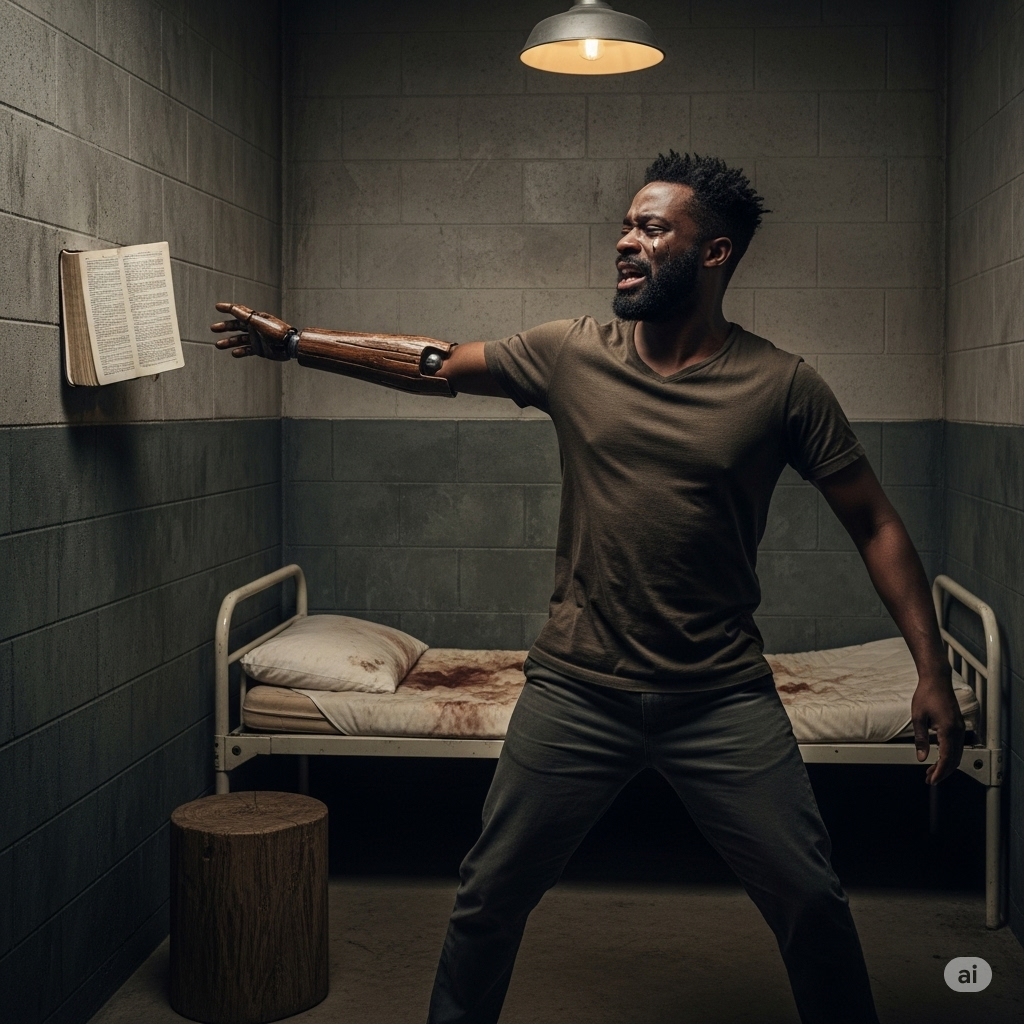

¶Back in Brandywine, he now has full awareness (red-pilled) and is seething. With little to lose, no time to waste, and realizing that he must act quickly if he is to self-fulfill a prophesy (of Armageddon and thus ending the curse, bringing forth the allure of exalted individualized deification). Accomplishing this is no small feat, as he sees enemies in regular folk as well as the corporations (viewing America itself as a corporation) -- all shareholders in corruption, and which are equally as guilty in oppressing him over time. Certain targets are harder to hit for reasons that are out of his area of expertise, but that's not going to stop him from trying.
¶Led by the vigilante, lnq👨🏿🦱, the 'Four Horsemen' (consisting of myself and henchmen - the lame boy Hephaestus + his mother Hera Juno + an architect Pallas Olopong) have made it their sole objective to exact revenge on Pascha and his ilk, forcing each to become the other's target.

 Put in survival-mode, Pascha must rely on his latent military skills to navigate an intense battlefield against an
Put in survival-mode, Pascha must rely on his latent military skills to navigate an intense battlefield against an AI that is playing wargames in civil war-torn Brandywine,
 which itself is cocooned inside an escalating armed conflict that in a short span has - thanks largely to his own ego - red alerted President Victor Guyold's White House and the Pentagon,
which itself is cocooned inside an escalating armed conflict that in a short span has - thanks largely to his own ego - red alerted President Victor Guyold's White House and the Pentagon,


as well as spawned defensive posturing from other global superpowers.





¶Stalking with a personal vendetta is Alven's brother-in-law, Dominique - fresh out of the penitentiary,

 whom Egg Pascha can no longer avoid. His calls of street justice for what was done to him when they were young men now demand a final answer (actually, Dominique's main goal is strike down Ember, no matter what it takes. He is out for revenge against her particularly, as she was the one who got him locked up for decades when she was DA. Pascha is problematic for him here because he is running her security detail. Alven dealing in choices on with whom to side leads to strife.).
whom Egg Pascha can no longer avoid. His calls of street justice for what was done to him when they were young men now demand a final answer (actually, Dominique's main goal is strike down Ember, no matter what it takes. He is out for revenge against her particularly, as she was the one who got him locked up for decades when she was DA. Pascha is problematic for him here because he is running her security detail. Alven dealing in choices on with whom to side leads to strife.).
¶With a special political election underway, the town's entrenched power elite are out to protect themselves from this rising menace (potential civil enmity) at considerable cost.
 Their tentacles run deep. Pascha's entire flotilla [spearheaded by Admiral Goode] turns against him (forcing him into absolute fugitivity), leaving him embroiled in a search for the truth about his colleagues, the city, and own future.
Their tentacles run deep. Pascha's entire flotilla [spearheaded by Admiral Goode] turns against him (forcing him into absolute fugitivity), leaving him embroiled in a search for the truth about his colleagues, the city, and own future.
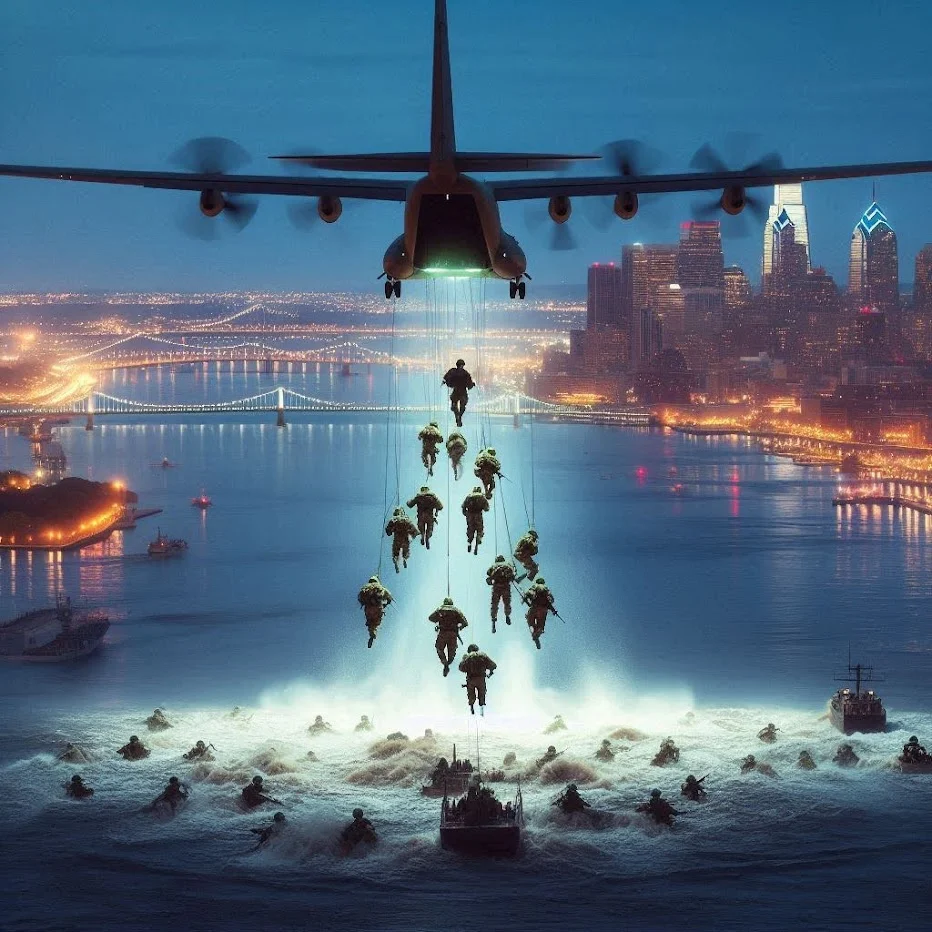




 Ironically, when he needs to be the most, he is perhaps at the least selfish point in his life; careless of what happens to himself, Egg Pascha desperately wonders if he can repair his broken relationships before it is too late?
Ironically, when he needs to be the most, he is perhaps at the least selfish point in his life; careless of what happens to himself, Egg Pascha desperately wonders if he can repair his broken relationships before it is too late?
 For even though he is hard on dying, his last bit of luck is a currency that must be spent.
For even though he is hard on dying, his last bit of luck is a currency that must be spent.
(#webisodes)
🗓due August 3, 2025 - November 11, 2025
(overture: Days 0 ["MURDER"]) - //The pilot webisodes are 2d cinema before the story moves to incorporate hyperreality.// --The title "Days 0" implies that its events are non-linear, unlike the rest of the program whose events supposedly happen in realtime. Timeline-wise, this part of Days 0 takes place in the middle of the last two acts during the civil war that is occurring in Brandywine. Implications from this scene lead to Egg Pascha getting arrested.

¶Egg Pascha is in trouble. Our boy is wanted for murder, actually. Framed? Perhaps. But, let's not deny that he's done his fair share of dirt of over the past few decades, and it's only a matter of time before karma catches up to him. One would think - or like to - that somebody gains more friends and compassion from others as they age. Well, it's just the opposite for Pascha, and it's sad, really.
¶The charges levied against him are substantial, but really are the least of his worries. These days, senescence has his mind going. Time seems to be flying by faster and faster for him. If his brain stops working, is he technically dead? He might as well be. By the looks of it there are those that want him gone. That sucks. We're talking about an old man here, have they no mercy? Nope. Brandywine is full of the four C's: crooks, corruption, crime, and those with a crabs-in-a-pot mentality. He may be having a difficult time remembering his past, but the City doesn't forget. He's back at home, right at home.
¶A saving grace, if we are to call it that, is that Egg Pascha has help. In order to get it, though, he must assist in solving an open criminal case that's not yet cold, but sits at lukewarm. That help comes in the form of much needed medication for his neurodegeneration. It also comes disguised as a buddy cop named Bunny. He's had on-duty partners in the past, but they don't seem to last long because he works better alone. On this case, so does Bunny. She's not a nice person, nor does she pretend to be. It doesn't help that she has built-in ill-will towards Pascha. Bunny has issues with men in general, doesn't like old people, and 'hops' around labs and crime scenes as she pleases - like her name suggests. Pascha only slows her down. That tension makes the temperature drop, further chilling the case. Still, everybody gets one true friend in Life, and for Egg Pascha that's Alven, his longtime companion who is there acting as his power of attorney and moves at a similar speed.

¶Back in Brandywine, Bunny is Pascha's partner/understudy as the duo hunt for "Theo", the region's notorious criminal figure. She respects Pascha's talents, but doesn't like him as a person, and that is an added layer of frustration that our ailing detective has to deal with.
¶lnq👨🏿🦱 is our favorite 🧩puzzler who is more of a freedom fighter these days (at least in this story). After digging into his history, lnq👨🏿🦱 is confused as to why Egg Pascha is such a celebrated man? Afterall, he destroyed a plaza in Los Angeles, obliterated an airport and transportation system in the nation's capital, rummaged through New York City, and almost caused a nuclear war in Ukraine. It's people like that who should be locked up, not roaming freely. His personal beef with Pascha is that he is working directly for Ember Libitina, the corrupt mayor whom he believes is underhandedly keeping Brandywine's crime statistics to a personal quota.

¶Together, lnq👨🏿🦱 and Bunny take a break from their respective public servant duties in Brandywine to pay a visit to Ric Flair - world-famous wrestler - in Georgia. Planning to retrieve and use the information to blackmail Pascha, they seek confirmation to the rumor that Flair may have been romantically involved with Pascha's now-dead ex-wife and fathered her daughter, Lily, sometime in the late 1970s. A visit to Flair, a discussion with him, and a DNA sample collected from him may help substantiate their hypothesis that Pascha is suffering from a mental and emotional breakdown, which is making his abuse of the law a menace to society. If true, this may be the source of his emotional/mental instability and the perfect excuse with which to frame him.
¶Flair is familiar with Pascha's old exploits and himself is left bewildered at the request; he has his own family already, and this news, while disturbing, obviously does nothing for anyone's well-being. In fact, it leaves him feeling bullied and wondering if this cop and volunteer firefighter are the more nefarious persons than they make an individual (Egg Pascha) whom he's never met out to be.--
¶Day 0 - "M" AFTER A LENGTHY INCARCERATION, DOMINIQUE IS ABOUT TO BE FREED FROM PRISON, BUT WHILE STILL THERE, USES HIS INSIDE INFLUENCES TO PUPPETEER - WITH THE AID OF HIS BROTHER-IN-LAW, ALVEN - THE OUTSIDE CRIMINAL WORLD AS HE PLOTS HIS REVENGE.

¶Day 0 - "MU" AN NCIS AGENT, BUNNY, IS AS RUTHLESS AS SHE IS CUNNING IN TAKING ON BRANDYWINE'S CRIMINAL UNDERWORLD BY HERSELF, SUCCUMBING TO PASSION ALONG THE WAY.

--Harkening backwards somewhat to create a referential plot point, Bunny has just deciphered clue codes that allow the cold case of Felix Yota to begin to thaw in the United States Coast Guard Auxiliary (USCGA) unit's ongoing months-long investigation of his brutal murder (victim's head crushed, mutilated genitalia, beating, etc.). It turns out that the victim was dating an intern of Mayor Libitina. There are suspicions that Bunny had somehow been involved in the crime from the start, and was protected by the mayor herself as a favor. Hence, we can see why she is rising in the ranks rather quickly.


¶A new assignment is underway for the talented young officer who is being quickly promoted through the ranks of the Coast Guard Investigative Service (CGIS): a dragnet is on for "Theo", the pest giving the mid-Atlantic a major headache. Bringing him to justice could lead to great rewards and coveted recognition that comes along with it. With the assistance of her connections to the city government and dubious ties to the criminal underworld, this shouldn't be a problem, and wouldn't be if she can just do things her way.--
¶Day 0 - "MUR" MAUNDY LINDROS' BUSINESS DEALINGS ARE UNDER THREAT. LILY AND HER POD ORCHESTRATE A CRUCIAL CONTRACT WITH THE U.S. GOVERNMENT THAT AFFECTS THE SECURITY OF THE ENTIRE COUNTRY.

¶Day 0 - "MURD" A HIGH-TECH, HIGH-STAKES TOURNAMENT IS UNDERWAY IN THE REGION AS A MEGACOMPANY ESTABLISHES ITS SECOND HEADQUARTERS IN BRANDYWINE.



¶Day 0 - "MURDE" THE MOB HAS LET AN OUTSIDE INVESTIGATION GET TOO CLOSE FOR COMFORT. ITS BOSS DECIDES TO GET HIS HANDS DIRTY.


¶Day 0 - "MURDER" INCOMPETENCE CAUSES A MURDER INVESTIGATION TO SWITCH LEADS, INADVERTENTLY INTRODUCING NEW SUBPLOTS AND OLD FAMILIAR CHARACTERS.

(epilogue: 00:00 Good Friday - 06:00 Easter Sunday [war/tribulation]) - //This part of the show is nearly entirely interactive. Viewers are to use their mobile devices to help Egg Pascha and Alven make choices according to on-screen decision trees. The action takes place over a gamemap in realtime (approximately 54 consecutive hours), so this is by far the longest part of the program.// -- Alven has just broken Egg Pascha out of jail during the tailend of Maundy Thursday night. Around the cityscape - in the wake of carnage instigated by lnq👨🏿🦱, tensions have already escalated to the point of civil war all throughout Brandywine, and the Pentagon has gotten involved. Wanted dead or alive, Pascha is the presumed treasonous black op (someone codenamed "John McClane"), but since Alven remains by his side, both of them are issued expendable and marked for death.


¶Wild animals have broken out of the Philadelphia Zoo and are now populating the streets, the airports are shuttered, waterways blocked, plus bridges and other landmarks have been destroyed, leaving the township in rubble with no lateral (longitudinal/latitudinal) exit points and encroaching tactical foot soldiers with instructions to kill on sight. Utilities have been cut off. Police stations, fire houses, and hospitals are either detonated or otherwise unavailable.





People are factioned, scared, frantic, hiding, and many of them are armed with limited munitions but clueless of what comes next. There is no easy escape; this is war, prepare to die hard. 
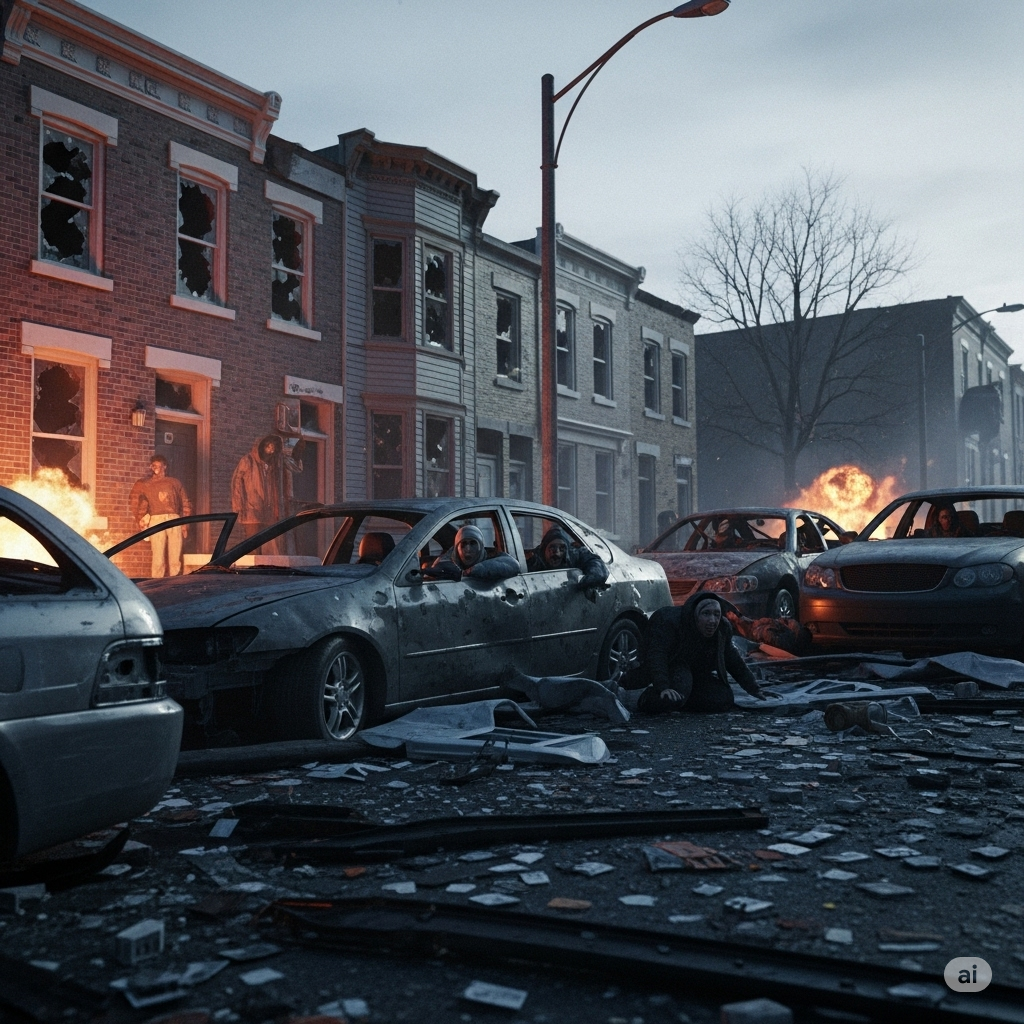
¶The already decimated battlefield technically starts under the cover of darkness beginning at midnight (00:00) on Good Friday.

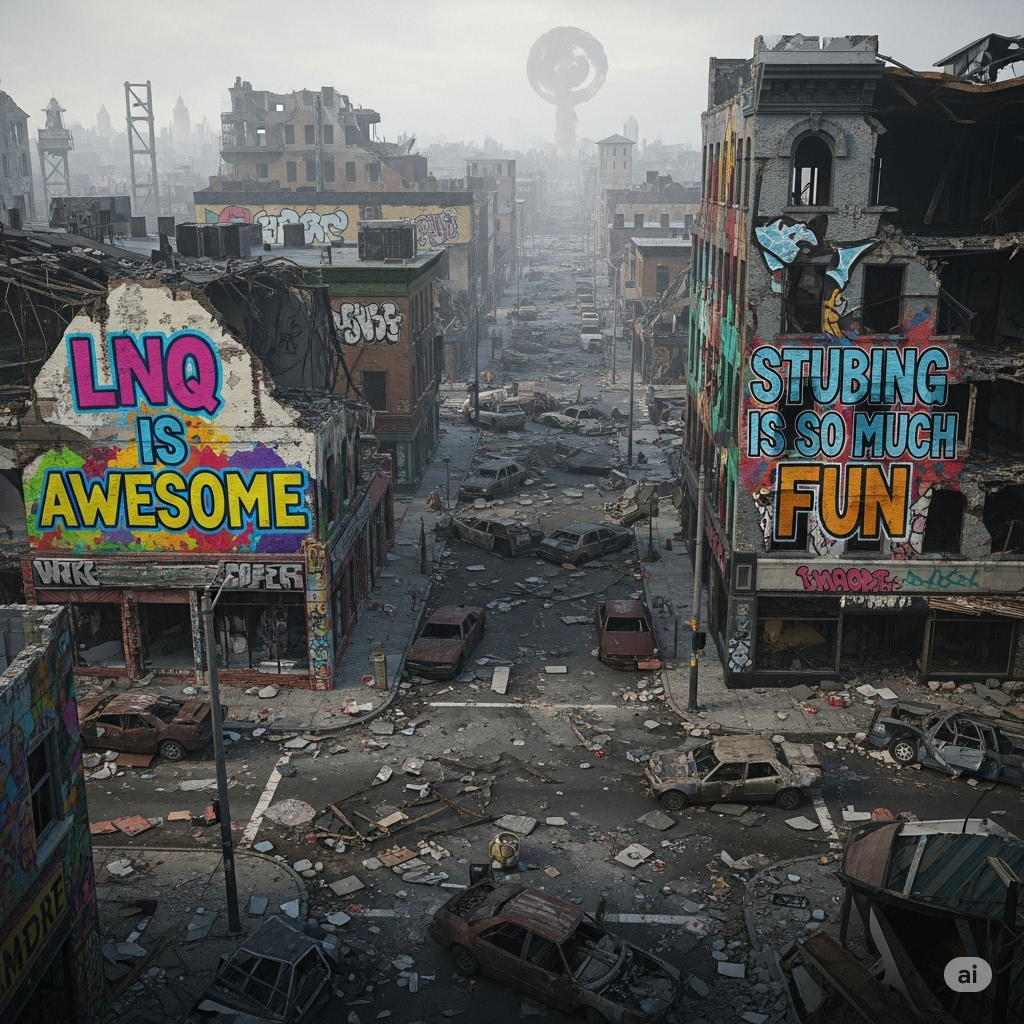
From Pascha's perspective, after the jailbreak, he needs to make it to the other side of town where his daughter, Lily - desperately hoping to be rescued, is being held hostage by the unorthodox pairing of Gunyo+Theo for personal gain. Even though they may not have the best relationship, the good father in him vows to use this chance to make up for lost effort with Lily. ...and still not caring as the clock ticks, the notorious 'SAINT BERNARD' needs specific information/intel for their mercenaries that only she possesses, by Monday's deadline. The hired guns (a rogue platoon of ex-government paramilitary contractors led by the imposing Iggy Veracruz) have been duped into this dire situation,

so they're betting that the payout/reward for them is huge.
¶Now, in order to get to that location (which is on a beached corvette),

he (and Alven) must first peripatetically (however, the cab driver, Smiley, is always only a whistle away) traverse a hostile terrain of armed civilians and military servicemen tracking him/them,



which, more than likely, will take a considerable amount of realtime (the full duration) to arrive at Lily's workplace.

¶He and Alven are senior citizens with latent combat/survival skills, so their pace and energy levels may not be what they used to be (a major reason why this is so time consuming). In addition to rest (cutscenes where the focus shifts to the ongoings of lnq👨🏿🦱 being THE apex predator that I am), they will also need to re-stock on food and supplies along the way, by looting stores and/or killing others for their weapons/ammunition.

"Gangsters move the way they do because they secretly want to die. Thugs move the way they do because it's no secret that somebody has to die." - lnq👨🏿🦱
¶The military🪖 campaign portion itself comes courtesy of the chapter's generative AI - prompted by Theo and sprinkled with Gunyo's holograms - actively playing wargames, having programmed inputs/outputs to regurgitate a modernized reenactment of the historical 'Philadelphia campaign' (1777-1778) of the American Revolutionary War from the vantage point of Valley Forge. This includes thirteen 'battles' that are in no specific order (only used here as plot devices to drive the action): BATTLE OF BRANDYWINE, BATTLE OF COOCH'S BRIDGE, BATTLE OF GERMANTOWN, BATTLE OF WHITE MARSH, BATTLE OF GLOUCESTER, BATTLE OF THE CLOUDS, BATTLE OF MATSON'S FORD, BATTLE OF QUINTON'S BRIDGE, BATTLE OF PAOLI, SIEGE OF FORT MIFFLIN, BATTLE OF BARREN HILL, BATTLE OF RED BANK/FORT MERCER, and BATTLE OF CROOKED BILLET.

¶Suffice it to say that the black op, "John McClane", being the hot target creates an unlikely alliance between lnq👨🏿🦱 and Alven+Pascha+Smiley joining forces as the storyline's third edition of the 'Four Horsemen' against (Gunyo) Gruber+Theo in a game of cat-and-mouse. This story unfolds to conclude on Easter Sunday at 06:00. -lnq👨






 Ember Libitina, Attorney General Emerita and Mayor[description:=
Ember Libitina, Attorney General Emerita and Mayor[description:=  de facto leader of
de facto leader of 




 Still, his friend,
Still, his friend,  Alven, deuteroganist[description:=
Alven, deuteroganist[description:=  while his work partner -
while his work partner -  Micha "🐇Bunny" Petrakis, understudy of Egg Pascha[description:= White female, early-30s years, thicc build (5'6'', 150lbs.-- really able to "squeeze in them jeans"), strong features of her Greek/Mediterranean heritage (dark hair/eyes) /// character := on loan to the
Micha "🐇Bunny" Petrakis, understudy of Egg Pascha[description:= White female, early-30s years, thicc build (5'6'', 150lbs.-- really able to "squeeze in them jeans"), strong features of her Greek/Mediterranean heritage (dark hair/eyes) /// character := on loan to the 
 Dwight Mann, mysterious leader of the conglomerate, Nile LLC[description:= White male, late 30s years, dark features /// character:= incredibly smart technologist who heads the world's most valuable company, of Ivy League (Princeton+Wharton) pedigree, always on the hunt for a good deal, his money makes him that much better-looking and he acts the part, has a mild fascination with East Asian cultures, vested interest in space colonization🚀, modeled after
Dwight Mann, mysterious leader of the conglomerate, Nile LLC[description:= White male, late 30s years, dark features /// character:= incredibly smart technologist who heads the world's most valuable company, of Ivy League (Princeton+Wharton) pedigree, always on the hunt for a good deal, his money makes him that much better-looking and he acts the part, has a mild fascination with East Asian cultures, vested interest in space colonization🚀, modeled after 




 Lily, daughter of Egg Pascha[description:=
Lily, daughter of Egg Pascha[description:=  Gunyo "Little Gun" Gruber, a member of Lily's pod[description:= White male, late-30s years, tall at 6'3'' /// character:= cunning
Gunyo "Little Gun" Gruber, a member of Lily's pod[description:= White male, late-30s years, tall at 6'3'' /// character:= cunning  Earl Ellis, a sleazy business executive and
Earl Ellis, a sleazy business executive and 




 Darby "Theo" Park, kingpin[description:=
Darby "Theo" Park, kingpin[description:= 















 The two have ambitions of being entertainers as a side hustle with their four-person vaudeville troupe 'Bruno'.
The two have ambitions of being entertainers as a side hustle with their four-person vaudeville troupe 'Bruno'.



















































 flaunting her industrial-strength money and changing Brandywine's political landscape with her bribery and ambitions; abusing her status to essentially buy controlling seats on the City Council. Via her business, Lindros FlyerCast and Irons, Ltd., she recently acquired the Philadelphia Naval Shipyard +
flaunting her industrial-strength money and changing Brandywine's political landscape with her bribery and ambitions; abusing her status to essentially buy controlling seats on the City Council. Via her business, Lindros FlyerCast and Irons, Ltd., she recently acquired the Philadelphia Naval Shipyard +  Dominique Noah, neighborhood imam[description:= Black male, late-60s years (mid-20s years in 1978 flashback) /// character:= he can preach until the moon turns blue, but secretly is deep-down tired of the choir itself, embittered, lately finds himself babysitting Tharbis' kids, originally from
Dominique Noah, neighborhood imam[description:= Black male, late-60s years (mid-20s years in 1978 flashback) /// character:= he can preach until the moon turns blue, but secretly is deep-down tired of the choir itself, embittered, lately finds himself babysitting Tharbis' kids, originally from 





































 Meanwhile, a worldwide pandemic in the form of a viral neurotoxin (biowarfare?) has crippled the global economy, and the anticipated aftermath of a recovery has sparked fears of a hegemonic shift between the Western and Eastern hemispheres; potentially resulting in a clash of cultures and an inevitable world war.
Meanwhile, a worldwide pandemic in the form of a viral neurotoxin (biowarfare?) has crippled the global economy, and the anticipated aftermath of a recovery has sparked fears of a hegemonic shift between the Western and Eastern hemispheres; potentially resulting in a clash of cultures and an inevitable world war. 
 SB's deliberate attempt to invoke the
SB's deliberate attempt to invoke the 


 For all it's worth, the Russians have played their cards right:
For all it's worth, the Russians have played their cards right:  they correctly bet that starting another relatively minor invasion with her neighbor would cause NATO to react by picking sides with and blindly supporting the opposition, thereby delivering economic inflation in those countries, to which voters would swing the pendulum back to neoconservatism,
they correctly bet that starting another relatively minor invasion with her neighbor would cause NATO to react by picking sides with and blindly supporting the opposition, thereby delivering economic inflation in those countries, to which voters would swing the pendulum back to neoconservatism, 



 headed by Kremlin operatives posing as darkhorse influencers who favor so-called 'democracy'. In short, traitors have convened in Washington, and now the 3
headed by Kremlin operatives posing as darkhorse influencers who favor so-called 'democracy'. In short, traitors have convened in Washington, and now the 3




 House Speaker Henza Turtl is pressuring Lindros to modify the company's payloads in order to accommodate an expected wave of asylum seekers relocating to the Delaware Valley,
House Speaker Henza Turtl is pressuring Lindros to modify the company's payloads in order to accommodate an expected wave of asylum seekers relocating to the Delaware Valley, 






































































































































































































 ¶In this stupendous story I wrote, Egg Pascha is relegated to both the first-person and third-person perspectives throughout the picture, so we rarely get to see him in the second-person (which is the typical
¶In this stupendous story I wrote, Egg Pascha is relegated to both the first-person and third-person perspectives throughout the picture, so we rarely get to see him in the second-person (which is the typical 












































 +military consultant [
+military consultant [










